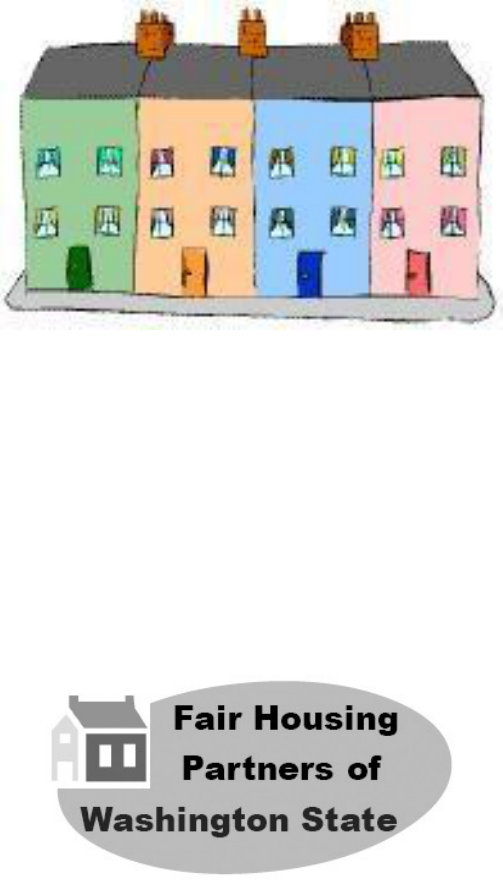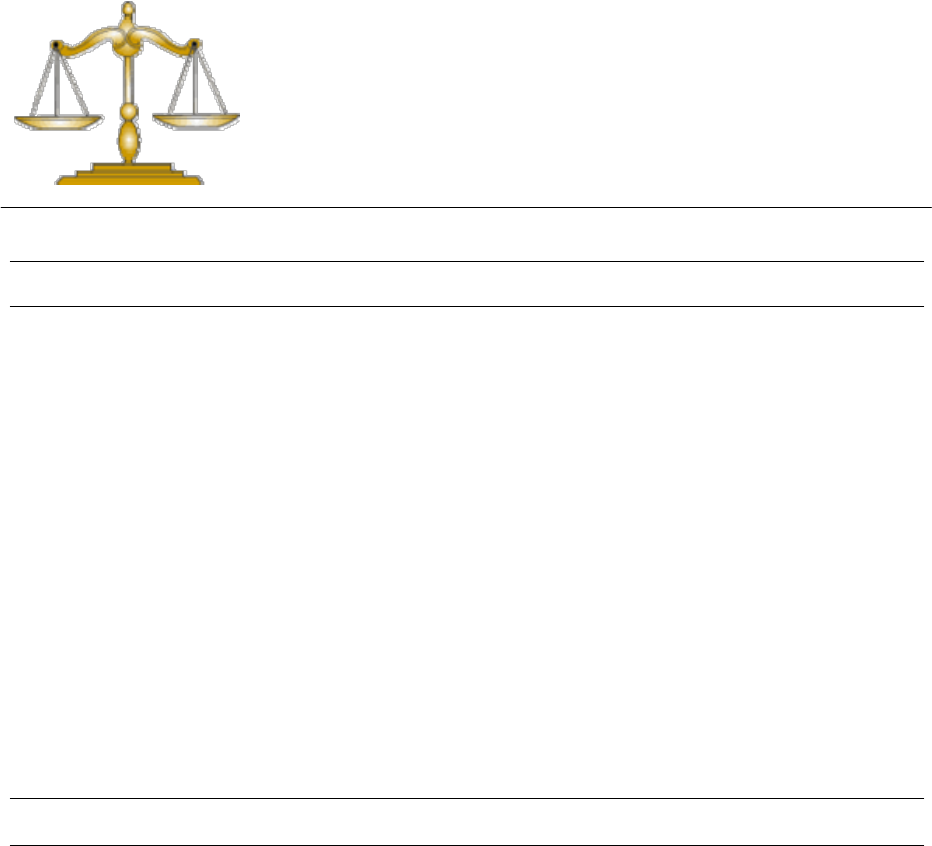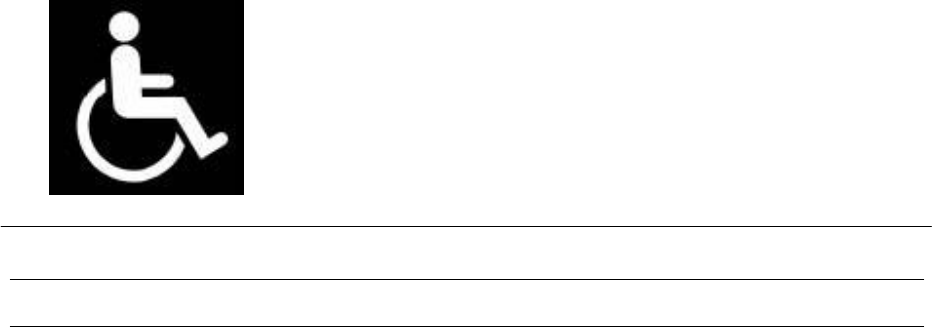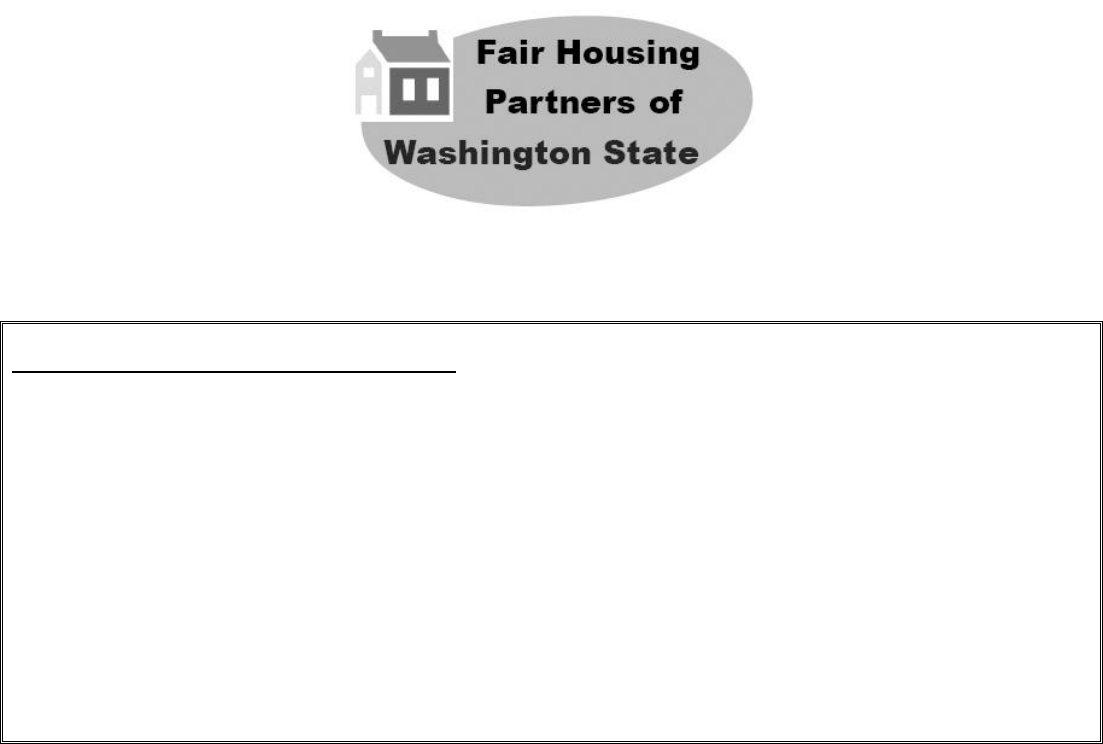
Fair Housing in
Washington State
Top 100 FAQs for
Property Owners and Managers
Seventh Edition (October 2013
)

Introduction
The Fair Housing Partners of Washington State have developed this
guidebook to assist you in understanding and complying with fair housing
laws. We hope you will find this information helpful in your efforts to provide
fair housing for all.
This free guidebook is available in CD format and also online at
www.kingcounty.gov/civilrights. The Fair Housing Partners have collaborated
to create other resources for housing providers –
•
Reasonable Accommodations and Modifications for People with Disabilities
•
Service Animals
•
Harassment & Retaliation
•
Domestic Violence & Fair Housing
•
A Guide to Fair Housing for Nonprofit Housing & Shelter Providers
•
Fair housing posters (specific to each fair housing agency)
To share your comments about this guidebook, please contact the King County
Office of Civil Rights.
FAIR HOUSING PARTNERS OF WASHINGTON STATE
Washington State Human Rights Commission
King County Office of Civil Rights
Seattle Office for Civil Rights
Tacoma Human Rights
Fair Housing Center of Washington
Northwest Fair Housing Alliance
This information does not constitute legal advice. The fair housing laws
are subject to change. Please consult with one of the Fair Housing Partner
agencies if you have further questions.
AVAILABLE IN ALTERNATE FORMATS UPON REQUEST
CONTACT KING COUNTY OFFICE OF CIVIL RIGHTS
206-263-2446 TTY Relay: 711 Civil-Rights.OCR@kingcounty.gov

Contents
CHAPTER ONE: FAIR HOUSING BASICS
Section A: A Brief History …………………………………………………………..
1
Section B: Fair Housing Laws ……………………………………………………….
1
CHAPTER TWO: FILLING YOUR VACANCIES
Section A: Advertising ………………………………………………………………….
6
Section B: Application and Screening …………………………………………
8
CHAPTER THREE: POLICIES & RULES
Section A: Tenancy Policies and Rules ……………………………………….
13
Section B: Harassment ………………………………………………………………….
16
Section C: Tenant-on-Tenant Harassment ………………………………..
17
Section D: Domestic Violence Issues …………………………………………
18
Section E: Retaliation …………………………………………………………………….
19
CHAPTER FOUR: PEOPLE WITH DISABILITIES
Section A: Disability Law 101 ……………………………………………………….
20
Section B: Welcoming People with Disabilities …………………………
21
Section C: Reasonable Accommodations & Modifications ………
23
Section D: Accessibility Requirements ……………………………………..
30
CHAPTER FIVE: FAMILIES WITH CHILDREN
Section A: Welcoming Families with Children …………………………..
32
Section B: Occupancy Standards & Surcharges ………………………
34
Section C: Family Friendly Rules & Regulations ……………………….
35
CHAPTER SIX: OTHER PROTECTED CLASSES
Section A: Housing for Older Persons ……………………………………….
37
Section B: Sexual Orientation & Gender Identity ………………….
40
Section C: Participation in Section 8 Program ………………………….
43
Section D: Veteran/Military Status …………………………………………..
44
APPENDICES
App. A: Fair Housing Agency Chart
App. B: Alternative Screening Documents
App. C: Common Disability Accommodations & Modifications
App. D: Glossary

1
Chapter One
Fair Housing Basics
Section A: A Brief History
The Civil Rights Act of 1866 guaranteed property rights to all, regardless of race. It
was another hundred years before any real change in fair housing came about, with
the passage of the federal Fair Housing Act – Title VIII of the Civil Rights Act of 1968,
which added color, national origin, religion and sex. The Fair Housing Act
represented the culmination of years of congressional consideration of housing
discrimination legislation. Its legislative history spanned the urban riots of 1967, the
release of the Report of the National Advisory Commission on Civil Disorders (the
Kerner Commission Report, which concluded that America was moving toward two
societies, separate and unequal), and the assassination of Dr. Martin Luther King, Jr.
In 1988, President Reagan signed the Fair Housing Amendments Act, adding two
more protected classes – families with children and people with disabilities,
strengthening the administrative and judicial enforcement process for U.S.
Department of Housing and Urban Development (HUD) complaints, and providing
monetary penalties in cases where housing discrimination is found to have occurred.
Section B: Fair Housing Laws
1. What fair housing laws apply in Washington state and who enforces them?
The federal Fair Housing Act and its 1988 amendments (FHA) protect people from
negative housing actions that occur because of their race, color, national origin,
religion, sex, disability, or family status, which are “protected classes” under the FHA.
State and local fair housing laws cover additional groups, such as marital status,
sexual orientation, gender identity, age, participation in the Section 8 Program,
veterans/military, etc.
HUD enforces the FHA. The Washington State Human Rights Commission
(WSHRC) enforces the Washington Law Against Discrimination, RCW 49.60. Three
local agencies enforce fair housing ordinances – King County Office of Civil Rights
(OCR), Seattle Office for Civil Rights (SOCR), and Tacoma Human Rights (THR).
The state and local laws are considered “substantially equivalent” to the FHA, and
HUD contracts with these agencies to handle most fair housing investigations in
Washington state.
2
2. Which laws apply to our property?
The Fair Housing Act and the state fair housing law cover most housing rental
properties. WSHRC has jurisdiction over housing anywhere in the state of
Washington. If a property is located in unincorporated King County, OCR has
jurisdiction. SOCR and THR handle complaints within the city limits of Seattle and
Tacoma. Also, three other cities investigate Section 8 complaints in their jurisdictions
– Bellevue, Kirkland and Redmond (WSHRC handles other fair housing cases in
these cities). Appendix A lists the fair housing agencies and their contact information.
Most types of housing properties are covered – leased or rented apartments; houses
or condominiums that are sold, leased or rented; homeowners' associations, rooming
houses; cooperatives; transitional housing; temporary shelters; mobile home parks;
roommate situations (except a renter can specify a roommate’s sex); construction
sites; and even empty lots. If uncertain whether your property is covered, contact any
local fair housing agency. See the Glossary in Appendix D for a list of exemptions.
3. What housing actions are prohibited by fair housing laws?
Fair housing laws prohibit the following housing actions:
Refusing to rent to someone or telling someone that a rental is not available
even though it is, because of his or her protected class.
Discriminating in the terms and conditions of rental because of a resident’s
protected class. [Examples: Sending violation notices to an Asian resident who
breaks a rule, but not to a Caucasian resident who breaks the same rule.
Charging additional deposits to families with children or to wheelchair users.
Allowing Russian residents but not Saudis to use the community center.]
Making, printing or publishing a notice, statement, or advertisement that
indicates any preference, limitation, or discrimination based on a protected class.
[Examples: Newspaper ad states “Apartment available for single person..”
Manager tells a Vietnamese applicant he’d be more comfortable in another
community that has people like him.]
Failing to provide reasonable accommodations to a person with a disability,
refusing to allow a disabled resident to make reasonable modifications, or failing
to meet access requirements. [Examples: Refusing to let a blind resident live
with a guide dog or not permitting a disabled person to install bathroom grab
bars. Having an on-site leasing office that is inaccessible.]
Enforcing a neutral rule or policy that has a disproportionately adverse effect on
a protected class, unless there is a valid business reason for the rule or policy,
and the housing provider can show that there is no less discriminatory means of
achieving the same result. [Example: Management has a rule that applicants
must have an income of at least three times the monthly rent. Because people
with Section 8 vouchers are low income, virtually all voucher holders would be
denied tenancy under such a rule. It is appropriate to apply a different standard –
for example, to require Section 8 applicants have an income three times their
portion of the rent.]
3
Retaliating against a resident or applicant because he or she has asserted fair
housing rights or has been a witness in a fair housing investigation. [Examples:
Refusing to make prompt repairs because a resident filed a fair housing
complaint. Evicting a resident because he was a witness in a civil rights
investigation.] This applies for informal verbal complaints to management as well
as formal discrimination cases filed with a civil rights agency.
Even though the original allegation might turn out to be unfounded, if a housing
provider takes retaliatory action, a retaliation complaint can be supported.
[Example: A resident complains of racial harassment. A week later, the manager
issues her a parking violation notice, but does not give notices to other residents
for the same offense. The resident files a harassment and retaliation complaint.
The civil rights office finds no evidence of harassment; however, the investigation
shows that the manager retaliated against the resident for the harassment
complaint by issuing the parking notice.]
4. Who can file a fair housing complaint?
Anyone who has been harmed by a housing action may file a complaint. Fair
housing laws also protect anyone who is harmed because of association with guests,
relatives, friends, roommates, subtenants or others in any of the protected
categories. [Example: A housing provider treats a resident badly because he has
Mexican guests. The resident and the guests could file fair housing complaints.]
Fair housing advocacy organizations that spend resources substantiating fair housing
violations also may file complaints. Also, enforcement agencies have the authority to
file a complaint without a complaining party when a situation merits such an action.
[Example: W h e n random testing shows a serious fair housing violation, the
enforcement agency files a complaint.]
5. How long do people have to file fair housing complaints?
Generally, a person must file a fair housing complaint within one year of the harmful
housing action. It is important to keep applications, resident files and other housing-
related records on file for a long enough period to be able to respond to housing
complaints and/or lawsuits.
6. Who may be held responsible for fair housing violations?
Fair housing complaints generally name all parties related to the property, including
the property owner, property management company, individual property management
staff, housing developers and contractors, advertising media, screening companies,
housing authorities, condominium associations/boards, homeowner associations,
mobile home park management, and in some cases, other residents. Each party
named in a complaint has a responsibility to respond to the allegations, to produce
documentation, and to make themselves available for interviews.
4
7. What is the relationship between fair housing laws and the state landlord-
tenant laws?
Fair housing issues often overlap with requirements of the state’s Residential
Landlord-Tenant Act (RLTA, RCW 59.18) and the Manufactured/Mobile Home
Landlord-Tenant Act (MHLTA, RCW 59.20). Landlord-tenant laws cover rental
agreements and leases, deposits and other fees, landlord and tenant responsibilities,
a landlord’s access to the rental, repairs, moving out and return of deposits,
evictions, etc. [ N o t e : The definition of retaliation under landlord-tenant laws is
different from the fair housing law definition.]
Fair housing agencies do not investigate violations of the landlord-tenant laws;
however, they investigate inconsistent application of tenancy rules based on
protected class. [Example: A fair housing agency won’t investigate a situation where
a deposit is not returned (a landlord-tenant issue). The agency will investigate an
allegation that an African American family’s deposit is withheld for carpet damage,
when a Caucasian resident’s deposit is returned despite similar damage.]
8. We just received a complaint from a civil rights agency. What happens now?
Housing providers often work hard to ensure compliance with the requirements of fair
housing laws. But despite your best efforts, you may be faced with a fair housing
complaint and an investigation. Take the complaint seriously and consider obtaining
legal advice if necessary.
Most housing complaints are filed both with HUD and with the state or local fair
housing agency with jurisdiction over the property. Both agencies send paperwork,
and the investigation is conducted by the state or local agency.
Fair housing agencies follow similar procedures for investigating complaints. Fair
housing agencies are required to attempt conciliation within 30 days, and offer
opportunities to resolve the case throughout the investigation. These agencies use a
mediation-style dispute resolution process to attempt a voluntary settlement of cases.
The civil rights agency expects a written response to the complaint within a short
time. This is an opportunity to present your side of the story. If you need more time,
call the agency and request a brief extension.
Before you respond to the complaint, gather all the documents related to the incident
or policy at issue. If you have maintained written resident files, and have established
and adhered to consistent operating policies, this should not be a difficult task.
Identify employees or other residents who might have some knowledge of the
complaint issues. Don't start interrogating folks -- just make a list of potential
witnesses and what they might know.
Many housing providers decide to deal directly with the fair housing agency. If this is
your option, take all the material you've put together and deliver it to the agency.
Some landlords or managers prefer to have their attorney handle the preparation of
an answer to the complaint. If you opt to work through an attorney, it is recommended
that you use one who is familiar with fair housing laws.
5
The investigation may include a "request for information" – such as asking you to
provide information about other residents or copies of documents from tenant files, to
show that you treat all residents in a similar way. Be sure to share all relevant
information, including your list of potential witnesses.
While the investigation may seem intrusive, and your inclination may be to hold back,
little can be accomplished by being evasive. Fair housing agencies have subpoena
power, meaning they can compel you and your company to turn over records and be
interviewed by the investigator.
The enforcement agencies are neutral fact-finders. They gather and evaluate
documentation, interview relevant witnesses, conduct on-site visits, etc. The resident
and housing providers have an opportunity to respond to each other’s positions, the
material and relevant evidence available to the agency is reviewed, and then the
agency writes a final written report.
If an investigation finds insufficient evidence to support the complaint issues, the
case is closed with a “no cause” finding. The complaining party may appeal or
request a reconsideration, and the respondent has an opportunity to respond to the
appeal.
If there is sufficient evidence to support the complaint allegations, a “reasonable
cause” finding is issued, the agency assists the parties in conciliating the matter, and
the parties sign a settlement agreement. If the parties do not settle, the case is
usually referred to the agency’s legal department and there is an administrative
process or a hearing.

6
Chapter Two
Filling Your Vacancies
Section A: Advertising
9. What advertising is covered under fair housing laws?
Fair housing laws cover all types of statements, advertising or marketing used in the
rental process, including a flyer or brochure, an ad in a newspaper, on the radio, in
magazines, on television, or on the Internet, a little note at the neighborhood
laundromat, a vacancy sign in the window, and word-of-mouth.
Fair housing laws prohibit making, printing or publishing any notice, statement, or
advertisement that indicates any preference, limitation, or discrimination based on a
protected class. These laws also prohibit making any verbal statement indicating a
preference or limiting housing based on someone’s protected class. [Example: A
manager cannot tell a family with children that they’d prefer a rental community with a
playground.]
10. Who is responsible for nondiscriminatory advertising?
Everyone involved in the advertising process is responsible for ensuring that no
statements or notices show preference for or limitation against any protected class.
The prohibition against discriminatory advertising applies to all housing transactions,
including single-family and owner-occupied housing that is otherwise exempt from
the FHA.
Ensure that everyone involved in advertising rentals is aware of the
nondiscriminatory advertising requirements. Inform the on-site leasing agents, off-site
property management company, and any advertising media that they should follow
nondiscriminatory advertising standards. If an ad service posts available rentals at
their storefront location or on the Internet, make sure that they use no discriminatory
statements.
To expand marketing options, consider advertising sources such as minority
newspapers, social services agencies and organizations for people with disabilities.
Local fair housing agencies may be able to refer you to some of these resources.

7
11. What are the requirements for using fair housing logos and posters?
Using the fair housing logo is a great way to show a commitment to
fair housing. Many housing providers use the Equal Housing
Opportunity logo in their ads and on their written materials to show
that they do business in compliance with fair housing laws. The
logo graphic (sample at right) is available in various sizes online at
www.hud.gov/library/bookshelf15/hudgraphics/fheologo.cfm.
HUD requires that owners and managers display a fair housing poster with this logo
at rental offices. This applies to rentals covered by the federal Fair Housing Act, and
to dwellings rented through a real estate broker/agent. (see 24 CFR 100)
The Seattle Municipal Code requires residential property managers and real estate
professionals within the city limits to prominently display a letter-sized fair housing
poster in their place of business. Failure to display the poster can result in fines.
Free posters with this logo are available from the fair housing agencies for each
jurisdiction (also available on their Web sites). Post them in the rental office and in
common areas to alert applicants and residents that fair housing is valued in your
rental community.
12. What can our advertising say?
The language used to advertise can pose fair housing problems. Avoid using words
or phrases that show a preference or discourage anyone because of protected class.
[Examples: Don’t use phrases such as “Christians only” or “perfect for mature
professionals”.]
It's a best practice for an ad to describe the property and its desirable features (size,
location, price, amenities), rather than some target audience.
13. Can we affirmatively market to any protected class?
Fair housing laws permit marketing for certain protected classes. It’s okay to
advertise –
that rentals are accessible for people with disabilities
that families are welcome, or emphasizing amenities such as a playground
that applications from those who have Section 8 Housing Choice Vouchers
are accepted
that veterans and members of the military and their families are welcome
that this is a HOPA property for seniors, if the property meets HOPA
requirements (see Chapter 6)
Indicating that these groups are welcome in a community does not deny any other
protected class the opportunity to apply for housing.

8
14. What about ads with human models or drawings?
Avoid using pictures or images that show a preference or discourage anyone
because of protected class. [Example: Don’t use a series of newspaper ads
publicizing vacancies using only young white models.] For advertising with
photographs or drawings of people, portray a variety of individuals who reflect the
population as a whole – men, women, children, people with disabilities, and people of
various races and ages.
Section B: Application and Screening
15. How do fair housing laws affect application and screening?
Housing providers have the right to determine if an applicant has the income and
rental history necessary to be a good tenant. Be certain to screen applicants in a
manner that complies with fair housing laws.
It is best to have clear criteria for rental of a dwelling that does not take into account
an applicant’s protected class. Ensure that all employees involved in the rental
process are familiar with and follow each policy consistently with all applicants. The
screening agency should also be aware of fair housing requirements.
Although consistency is important, some applicants may require special
consideration:
People with disabilities may need reasonable accommodations during the
application and screening process.
It’s okay to refuse rental to individuals who have a history of criminal
convictions.
New immigrants to the U.S. can present challenging screening issues. See
Appendix B for a list of effective alternative documents that help determine
whether these applicants meet rental criteria.
16. If several applicants want the same rental, can we choose who we think is
best, based on our experience?
While experience is invaluable, be careful not to take possible discriminatory actions
based on unconscious biases. Some applicants look okay, then turn out to be bad
residents, and a housing provider working on assumptions may not know that until
after they sign a lease. A fair screening process that is applied equally to all
applicants will get results that are more consistent (and result in fewer fair housing
complaints).
If several applicants are interested in the same rental, it’s best to screen them on a
first-come, first-served basis, using objective criteria, and then offer the rental to the
first qualified applicant. It helps to date and time-stamp applications. Pre-printed
documents help to ensure that consistent information is gathered.
9
17. If we feel an applicant won’t be a good resident, can we say that a rental is
not available when it actually is?
It is a violation of fair housing laws to state that a rental is not available when it
actually is. It is best to rely on an objective screening process, not assumptions, to
determine if applicants meet your criteria. Fair housing complaints are more easily
avoided when applicants receive clear and consistent information about all housing
options, including waiting lists.
Ever heard of the “Secret Shopper” program, where someone visits rental
communities to observe customer service? Fair housing agencies use a similar
testing process to assess a specific complaint or to check a random market for fair
housing compliance. Any applicant could be a fair housing tester!
18. Do we have to respond to all rental inquiries?
From a business standpoint, it makes sense to respond to all inquiries – that person
asking about rental could make a terrific resident! Rental inquiries come in many
forms – walk-ins, telephone calls, e-mails, online inquiries. Here are some tips:
Telecommunications Relay Service – People who are deaf, hard of hearing, or
have speech disabilities may make telephone contact via the state’s Relay
Service. It is a reasonable accommodation to communicate with them by using
the Relay Service. Anyone can make phone calls through the Service – just dial
711.
Linguistic Profiling – Under fair housing laws, it is not legal to consider an
applicant’s race, national origin or ancestry when making rental decisions.
Sometimes an applicant suspects that an accent was the reason for not getting a
call-back, for being told no rental was available, or for being given minimal rental
information on the telephone. Although some people claim they didn’t know a
caller’s race, research shows that most people can accurately determine race
just by hearing a caller’s voice. These studies indicate that “linguistic profiling”
occurs when people use speech characteristics or dialect to identify a speaker's
race, national origin, ancestry or religion. It would be discriminatory not to call
back, to lie about rental availability, or to withhold rental information because of a
caller’s perceived race, national origin, ancestry, or other protected class.
Name Discrimination – This happens when a housing provider takes a negative
rental action based on names alone. A recent housing study showed that more
than half of the time, housing providers did not respond or responded negatively
to an e-mail from someone with a “black” sounding name, and one-third failed to
respond positively to an e-mail from a person with an Middle Eastern-sounding
name. The study’s authors noted that “names may disclose our religious
affiliation, sex, social position, ethnic background, tribal affiliation and even age.”
It would violate fair housing laws to refuse rental because of perceived national
origin, religion or race based on an applicant’s name.

10
19. Is it legal to request to see photo ID from applicants?
Some housing providers request identification from applicants for safety reasons or to
verify identity. This is okay as long as the request is not based on an applicant’s
protected class. [Example: Require ID from all applicants, not just from Hispanics.]
Be aware that requiring a specific form of photo ID, such as a driver's license, may
have a disproportionate adverse effect on members of certain protected classes,
since some people with disabilities or people from other countries may not have
driver's licenses (but they may have other photo IDs).
20. Can we conduct separate credit checks for each adult applicant?
If a housing provider has a policy of running a joint credit check for married couples,
it is okay to ask unmarried couples to file separate applications and to undergo
separate credit checks, because they do not have the “community property” status of
a married couple.
In the City of Seattle and in unincorporated King County, where “marital status”
includes “cohabiting,” management should treat an unmarried couple similarly to
married couples once they become residents.
Some people, including gay or lesbian couples and heterosexual couples where one
person is 62 or older, have registered as domestic partners with the Secretary of
State. Regardless of their registration status, they can also be charged separate
credit check fees.
21. What if someone who doesn’t speak English applies for a rental?
People with limited English proficiency or a heavy accent are covered under the
national origin or ancestry protections of fair housing laws. An applicant cannot be
turned away because of an accent or because communication is a bit challenging.
Make reasonable efforts to lead these applicants through the normal rental
procedures in English.
Housing providers are not expected to translate their promotional materials,
applications, or rental agreements to meet the language needs of all applicants.
However, from a marketing standpoint, it may make business sense to translate
some basic forms for a property that is in a community with many foreign language
speakers. [Example: Translate application, lease and rules into Spanish.]
Federally funded properties are required to provide certain rental documents in
foreign languages under the Limited English Proficiency regulations. See HUD’s
“Guidance to Federal Financial Assistance Recipients Regarding Title VI Prohibition
Against National Origin Discrimination Affecting Limited English Proficient Persons”
at www.hud.gov/offices/fheo/promotingfh/FederalRegistepublishedguidance.pdf.
11
22. Can we verify that someone is legally in the U.S.?
Employers are held responsible if they hire someone who may not legally work in the
U.S., but housing providers have no similar responsibilities in our state, and are not
held accountable if any of their residents are in the U.S. without status.
Don’t ask an applicant for proof of legal status just because he or she has an accent,
speaks English poorly, or just “looks foreign” – that risks a fair housing complaint
based on national origin or ancestry. Under fair housing laws, asking applicants if
they are in the country legally is only acceptable if every applicant is asked for proof
of legal residency. [Example: It is discriminatory for a manager to ask an Asian-
looking applicant for legal status, but not to ask all other applicants.]
23. What if an applicant is a recent immigrant with no social security number,
and with little or no employment or rental history in the U.S.?
Many housing providers use screening criteria that depend on information such as a
social security number, past employment and rental history. Alternative documents
are available to determine if a recent immigrant is able to pay the rent and follow the
rules. Appendix B contains a list of documents that will assist in determining an
applicant’s identity, rental history, and credit history or ability to pay rent.
24. Is it okay to offer rental "specials" to increase applications?
This is a common marketing practice. Unfortunately, sometimes a prospective renter
may pick up on differences in specials that seem related to protected class, and that
can lead to fair housing complaints. Here is how to minimize this risk:
Put all special offers in writing and ensure that all staff are aware of them.
Make certain all applicants hear about every rental special.
Document all exceptions made to regular rental rates. If two residents are
charged different rates for apparently identical rentals, note why.
Federal and state fair housing laws allow senior discounts so long as they are
based solely on age, are available to families with children, and are not
otherwise handled in a way that results in the exclusion of families with children.
However, age discrimination is illegal under the Seattle, Tacoma, and King
County fair housing ordinances – including the offer of lower rent to a preferred
age group. If the intent is to increase the number of good residents, then
consider offering a rebate to those who pay promptly and incur no rule violations
within their first year of rental.
25. Can we refuse applicants because of their criminal history?
Having a criminal record is not a protected class under fair housing laws. Housing
providers can establish screening criteria that rejects applicants with criminal records.
However, do not confuse arrests with convictions. Patterns of arrest have been
viewed as discriminatory against some protected classes, so arrest records are
inappropriate to use as a screening criteria.
12
It is discriminatory to perform criminal background checks only on certain applicants,
or to distinguish between applicants with criminal records based on protected class.
[Examples: A manager should not conduct criminal checks only on African American
males. Or a landlord cannot accept a female applicant with an assault conviction,
and reject male applicants with similar convictions.] The key is to ensure that the
process is fair, and neither directly nor indirectly discriminates based on any
protected class.
26. How do fair housing laws affect income and employment requirements?
Housing providers can use income and employment requirements as long as they
apply them consistently, without regard to an applicant’s protected class. Here are
some issues to consider:
For Section 8 program participants, Housing Authorities have already made a
determination that the resident can afford their portion of the rent. The housing
subsidy is a mechanism for ensuring that a low-income family can afford a
rental in the private market. For those who use income screening criteria
(such as “income must equal three times the rent”), calculate only the Section
8 participant’s portion of the rent.
Most credit decisions utilize gross income as the basis for calculating the
income to housing cost ratio. “Gross up” non-taxed income such as social
security. [Example: Calculate the fixed income of a person with a disability to
reflect the taxable income a nondisabled person would have to earn to net the
same amount.]
Requiring that a person’s income be garnishable could be a violation of fair
housing laws, especially for people on social security disability income (SSDI).
As a reasonable accommodation, waive a garnishable income requirement for
SSDI.
As a reasonable accommodation, an applicant with a disability may ask to use
a co-signer or third party payee.
Consider aggregating the income of all adult household members to calculate
the ratio. To calculate income, include verifiable employment, public
assistance, social security, retirement/pension, asset/interest income, child
support, adoption assistance, foster child support, food stamps, veteran’s
benefits, student employment, and other types of cash income.
Income stability may be as relevant as employment history. Keep in mind that
a requirement that applicants have employment could have a discriminatory
effect on certain protected classes, such as people with disabilities or families
with children.

13
Chapter Three
Policies and Rules
Section A: Tenancy Policies and Rules
27. What do we need to know about setting policies and enforcing tenancy
rules, from a fair housing perspective?
Fair housing laws require that policies and rules do not single out residents based on
their protected class. Rules should not be enforced differently because of a
resident’s protected class. To minimize the risk of violating fair housing laws, review
each policy for protected class language and for unintended discriminatory bias.
Good business practices often are good fair housing practices, too. Put rules and
policies in writing to ensure that all residents are aware of them. Apply the rules and
policies equally, regardless of a resident's protected class. Treat residents similarly
when they don’t follow rules. Finally, keep thorough written records of all actions
taken when enforcing resident rules and regulations.
Fair housing laws do not prevent a housing provider from warning residents who
break the rules, disturb others, create a nuisance, or fail to pay rent. Fair housing
laws simply require that a resident’s protected class doesn’t enter into the equation.
28. What policies or rules will help us comply with fair housing laws?
Most rental housing communities have general tenancy rules that outline expected
actions and behaviors, such as making timely payments, observing quiet hours,
parking in assigned spaces, etc. Review these rules or policies to make certain they
do not target any protected class group. [Example: Don’t state “children cannot ride
bikes in the parking lot” – instead, say “bicycle riding is not allowed in the parking
lot”.] If in doubt about whether written policies and rules comply with fair housing
laws, ask a fair housing agency to review them and suggest rephrasing if necessary.
Many housing communities have begun adopting antiharassment and
antidiscrimination policies. Be certain any such policy includes mention of all the
protected classes of individuals for the area where the rental housing is located. See
Appendix A for a complete list of protected classes.
14
29. One of our residents is a good friend, so we let her pay her rent late. Will
that get us into trouble?
Giving a friend more favorable treatment may leave management vulnerable to
accusations of discrimination. Playing favorites may cause other residents to feel that
the different treatment is based on their protected class. [Example: A resident gets a
$20 rent increase but other residents get no increase that month. The reason
is that management is increasing rent for all residents at the end of their lease terms,
but haven’t communicated this to the residents.]
30. Can we establish rules that prohibit smoking, cooking of certain foods, or
making other unpleasant smells?
Being a smoker is not a protected class under fair housing laws, so housing
providers can set and enforce any rules they like about smoking (including having no-
smoking buildings or no-smoking areas).
In many rental communities, the aromas of the residents’ cooking can escape into the
hallways. An occasional food odor, such as fish, garlic or curry, is inevitable and
should be tolerated by other residents. A housing provider should not deny residents
the full use and enjoyment of their apartment by asking them to stop cooking their
choice of foods.
Housing providers have a right to establish reasonable rules and regulations for the
comfort and peaceful enjoyment of all residents. If any resident creates strong
objectionable smells that pervade common areas such as hallways, the cause of the
smells doesn’t matter. If a situation involves offensive smells that go beyond normal
odors, a housing provider can request that the household stop creating the odor.
31. What fair housing issues should we be aware of in processing
maintenance requests?
Maintenance employees are very visible and frequently interact with residents. When
they treat residents fairly and professionally, it goes a long way toward preventing fair
housing complaints. Housing providers are responsible for the actions of all
employees, so it is very important to train maintenance staff on fair housing issues.
A common complaint that fair housing enforcement agencies receive is that members
of one protected class get their maintenance requests handled more quickly than do
members of another protected class. To avoid this type of allegation, consider
establishing a clear maintenance response policy and document requests for repairs.
Keep thorough documentation of work requests and maintenance actions taken, for
one year or longer. It is best to stay in communication with residents about their
repair requests, especially if there are delays.
32. What sorts of evictions could violate fair housing laws?
The eviction process is a costly part of doing business – be sure not to make it more
costly by evicting for discriminatory reasons. When a resident breaks rules that call
15
for an eviction, know how to evict lawfully, and follow eviction laws consistently and
fairly. An eviction will comply with fair housing laws if the resident’s protected class is
not a factor in the decision to evict.
Here are examples of situations that could violate fair housing laws (some of these
situations are not covered in all jurisdictions):
a single female resident is told that her partner is approved to move in with
her, and then is evicted when management learns that her partner is of a
different nationality or race than the resident
a couple in a large one bedroom rental is asked to vacate after they have a
child
residents who associate with people of a particular sexual orientation are
treated negatively by management
33. How can we evict residents without violating fair housing laws?
A housing provider can evict a resident for valid, nondiscriminatory reasons such as
breaking the rules after being warned, repeatedly being late with rent, failing to pay
rent, damaging the rental property, or breaking public laws. The resident’s protected
class should not be considered in the decision to evict. Remember to be consistent
and keep thorough written records.
34. When can we make an exception to the rules?
Whenever an exception is needed. If exceptions must be made when implementing
rules, document them carefully. [Example: A late fee is charged for residents who
pay rent late during their first year of residency, but no fee is charged for a long-term
resident who previously made timely payments and pays late once.] Analyze
situations on a case-by-case basis when making exceptions to a rule. Don’t make
exceptions based on someone’s protected class. Document the reasons for the
exceptions thoroughly.
Remember, an applicant or resident who is a person with a disability may need a
reasonable accommodation in order to use and enjoy a dwelling. A housing provider
is required to make needed accommodations, even if they may constitute an
exception to the usual rules. See Chapter 4. For more detailed information, see the
Sample Policy on Reasonable Accommodations for People with Disabilities by the
Fair Housing Partners of Washington State.
35. What records should be kept to document our management actions?
It’s best to keep all written records concerning:
resident payments
complaints from other residents
warnings issued, both verbal and written
information leading to an eviction.

16
Remember that people can file fair housing complaints from six months to a year
after the alleged discriminatory action, depending on the jurisdiction (and longer to
file a lawsuit). Keeping thorough records will help in responding to allegations of
discrimination. Also, keep all applications, resident files and prior policies on file for a
reasonable length of time to be able to respond to any fair housing complaints or
lawsuits.
Section B: Harassment
36. What constitutes harassment under fair housing laws?
Fair housing laws prohibit housing providers from harassing residents because of
their protected class. Housing providers are responsible for the behavior of their
employees and vendors. Harassment includes various negative actions that are
taken because of someone’s protected class – sexual harassment, selective
enforcement of rules, derogatory statements, ignored maintenance requests, etc.
A housing provider can be found liable if the harassing treatment rises to the level of
“severe or pervasive” conduct that creates a hostile living environment. One or two
incidents will rarely constitute harassment. However, in situations where the episodes
were egregious, courts have determined that the “severe or pervasive” standard was
met when there was a single incident.
The best prevention strategy is to write and periodically distribute a non-harassment
policy to all residents, employees and contractors, and to train employees on how to
prevent and remedy all forms of harassment. If a resident reports harassment,
respond quickly and effectively, and follow up to ensure that the problem does not
recur. Finally, remember to document everything. For more detailed information, see
the Sample Policy on Tenant on Tenant Harassment available from the Fair Housing
Partners of Washington State.
37. What types of conduct are considered to be sexual harassment?
Sexually harassing conduct can be verbal (derogatory remarks, slurs, jokes,
intimidation, and even threats of violence), physical (body gestures, whistling, ogling,
unwelcome touching or physical violence), or visual (inappropriate sexually-oriented
written materials or pictures). Sexual harassment also occurs when a resident’s
housing is conditioned on agreeing to sexual favors. [Example: A manager
demands a date in exchange for a rent reduction.] The legal term for this type of
harassment is quid pro quo – “this for that”. Again, the treatment is considered
harassment if it rises to the level of “severe or pervasive” conduct.
38. A resident said our maintenance worker told her she’d get a quicker repair
if she’d give him a kiss. What should we do?
This is an example of "quid pro quo” harassment. Employers are responsible for the

17
behavior of their employees and vendors who work on-site. If a resident complains of
sexual harassment, take prompt action to remedy the situation and prevent
harassment in the future. Follow up with the resident and document everything.
This type of situation can be handled more effectively if there is a written harassment
policy. The policy should clearly outline what a resident can do and who to contact if
harassment occurs.
Section C: Tenant on Tenant Harassment
39. A resident complained that her neighbor harassed her. What should we
do?
The word “harassment” means different things to different people. When someone
reports harassment, gather specific information about what words and behaviors
were involved. This helps management to determine if behavior is based on the
resident’s protected class. If so, follow the antiharassment policy.
40. How should we deal with a harassment complaint?
If there are threats of violence or actual physical violence, call 911 or urge the
resident to do so. For non-emergency situations, tell the complaining resident that
complaints are taken seriously and an investigation will be conducted.
Start an investigation right away –
Interview the complaining resident and any witnesses who might have
observed the incident.
Interview the alleged harasser. Let the person know that harassment based on
protected class will not be tolerated.
Document the complaint and the investigation results in both tenants’ files.
If harassment cannot be verified –
Remind everyone involved that management has made a serious commitment
to a housing environment free of harassment.
Promptly inform the complaining resident of the investigation results and the
actions taken.
Remind everyone that retaliation against the complaining resident or
witnesses will not be tolerated. Monitor for retaliation.
For ongoing resident conflict that appears not to be associated with protected
class, refer residents to the local Dispute Resolution Center or other mediation
services, or consider hiring an outside consultant/mediator.

18
If the investigation verifies the harassment complaint –
Proceed with progressive disciplinary action against the harasser, up to and
including eviction if necessary for ongoing or serious violations.
Promptly inform the complaining resident of the investigation results and the
actions taken.
Remind everyone that retaliation against the complaining resident or
witnesses will not be tolerated. Monitor for retaliation.
41. We don’t get involved in private resident disputes. A resident claims a
neighbor called him a negative racial name. Should we do anything?
When a housing provider is aware that a resident may be experiencing harassment
because of his protected class, the provider has a legal responsibility to investigate,
to take action to stop any harassing behavior, and to ensure that it does not recur. If
a housing provider fails to take effective action, a fair housing complaint can be filed.
Section D: Domestic Violence Issues
42. We issued a vacate notice to a household that had a domestic violence
incident. Is this okay under fair housing laws?
Fair housing cases have been filed when management took action against the entire
household after a woman was a victim of domestic violence. [Example: A husband is
arrested after beating his wife, who then obtains a protection order. Management
sends the household an eviction notice under its “zero tolerance for violence policy”.
Although the policy is applied equally to all households where violence occurs, it has
a disproportionate adverse impact on women, who are the victims of domestic
violence the majority of the time.] In a situation where a female is the domestic
violence victim but is capable of maintaining her tenancy, such a policy should not be
used to evict her.
The Washington State Residential Landlord Tenant Act (RLTA, RCW 59.18) provides
guidance for housing providers when residents or applicants are victims of domestic
violence, sexual assault, or stalking. For more information, see “Landlord/Tenant
Issues For Survivors of Domestic Violence, Sexual Assault, and/or Stalking” by the
Northwest Justice Project, online at www.washingtonlawhelp.org.
43. Can we refuse to rent to someone who has been involved in a domestic
violence incident?
Fair housing laws do not protect individuals who have a criminal record or rental
history of being a perpetrator of domestic violence, so it is okay to refuse them rental.
When a woman’s screening report shows a domestic violence incident, she should

19
not be automatically rejected. Instead, ask her to provide information confirming that
she was the victim. If she was and she otherwise qualifies for rental, process her
application just like for other applicants. Do not make generalizations that she will
bring trouble to the rental – look at her circumstances individually.
Section E: Retaliation
44. What is retaliation under fair housing laws?
Retaliation is an act of harm by a housing provider against an applicant or resident
because he or she has asserted fair housing rights, or has been a witness in a fair
housing situation. The fair housing complaint can be formal (a civil rights complaint)
or informal (a verbal complaint to management). [Examples: After a resident
complains of harassment, the manager won’t make repairs for her. Or a resident is a
witness in an investigation, and then the manager tells her he’s watching her more
closely for rule violations.]
A retaliation complaint can be supported even when the underlying complaint is not
proven. [Example: After a resident gets a notice for noise, she files a harassment
complaint with a civil rights agency. The manager gets upset about the complaint, so
he issues a notice to vacate to the resident, who then files a retaliation complaint. An
investigation shows that there was no harassment. However, the resident wins the
retaliation case, because the manager gave her the vacate notice only because she
filed the harassment complaint.]
After receiving a fair housing complaint, a housing provider can still take appropriate
actions when that resident violates the rules. Be consistent – issue rule violation
notices throughout a person’s tenancy and for all residents similarly, so that
management actions can be supported. Inconsistency can look like possible
discrimination.

20
Chapter Four
People with Disabilities
Section A: Disability Law 101
45. What disability laws apply to housing?
Fair Housing Act, state and local fair housing laws
Prohibit discrimination against people with disabilities and against those who
associate with them.
Require provision of "reasonable accommodations” as necessary to afford
such person(s) equal opportunity to use and enjoy a dwelling.
Require housing providers to allow residents with disabilities to make
“reasonable modifications” to rentals and common areas.
Require accessibility design and construction for covered multifamily
housing.
Section 504 of the Rehabilitation Act of 1973
Prohibits discrimination based on disability in any housing, program or
activity receiving federal financial assistance.
Americans with Disabilities Act
Title II prohibits discrimination based on disability in programs, services, and
activities provided or made available by public entities (state and local public
housing, housing authorities, housing assistance and housing referrals).
Title III covers housing community areas that are open to the public (such as
a rental office) or available for use by the public (such as a clubhouse rented
to non-residents).
46. Who is considered a person with a disability?
Various fair housing laws use the terms “handicap” and “disability” interchangeably.
Disability is the preferred term when referring to this group.

21
Federal law defines a person with a disability as:
a person who has a physical or mental impairment that substantially limits
one or more major life activities (“major life activity” means those activities
that are of central importance to daily life, such as seeing, hearing, walking,
breathing, performing manual tasks, caring for one’s self, learning, and
speaking)
someone who is regarded as having such an impairment
individuals with a record of such an impairment.
The Washington State Law Against Discrimination and local fair housing laws define
disability more broadly, and include some people with temporary disabilities.
47. Who does not have a disability?
Under fair housing laws, the definition does not include:
sex offenders
current illegal drug users (however, fair housing laws do protect people who
are recovering from substance abuse)
those with convictions for the illegal manufacture or distribution of a
controlled substance
Section B: Welcoming People with Disabilities
48. Can we target our marketing to attract people with disabilities?
Under fair housing laws, housing providers may affirmatively market to
people with disabilities. It helps to use the international symbol of access
in ads and on signs (sample at right). The symbol graphic is available
online at www.graphicartistsguild.org/resources/disability- access-symbols.
To expand marketing options, consider advertising sources such as minority
newspapers, social services agencies and organizations for people with disabilities.
49. How can our community show that we welcome people with disabilities?
There are many ways to demonstrate this.
Use the fair housing logo and access symbol. Ads, brochures, signs and
application materials can reflect accessibility and fair housing compliance.
Make sure that the rental community meets the state and federal accessibility
standards. For older buildings, ensure that the leasing office is accessible and
that there is an accessible route from public transportation to the office.
22
It’s a wise practice to develop a reasonable accommodations/modifications
policy
and have it available for applicants and residents.
Make certain a model rental is on an accessible route. Rental staff should know
the community’s accessible routes and be able to point out access features.
Not all disabilities are obvious, so let all applicants and residents know that
reasonable accommodations will be provided upon request. Include a written
notice in application materials and in resident rules that states a willingness to
provide accommodations.
Train staff on how to respond to reasonable accommodation requests in a timely
and professional manner.
For more detailed information, see the Sample Policy on Reasonable
Accommodations and Modifications for People with Disabilities available from the
Fair Housing Partners of Washington State.
50. What questions can we ask applicants about disabilities, and what
questions should we avoid?
It is usually unlawful to ask if an applicant or resident has a disability, or to ask about
the nature or severity of the person’s disabilities. When the housing property is a
recipient of federal low-income housing tax credits or is designed to provide housing
for people with a certain type of disability, the following inquiries may be made of all
applicants:
Can you meet the requirements of tenancy?
Do you qualify for a dwelling legally available only to persons with a disability
or to persons with a particular type of disability?
Do you qualify for housing that is legally available on a priority basis to
persons with disabilities or to persons with a particular disability?
Do not ask questions such as:
How did you become disabled?
Do you take medication?
Why are you getting SSI?
What does that service animal do?
Can I see your medical records?
Have you ever been hospitalized for mental illness?
Have you ever been in drug or alcohol rehab?
Are you capable of living independently?

23
51. What if an applicant or resident voluntarily shares information about a
disabling condition?
Whether in casual conversation, or in the process of requesting a reasonable
accommodation, sometimes a person will reveal information about a disability,
medical treatment, or details about what tasks a service animal does. Management
must keep this information confidential and should not share it except –
with management employees who need information to assess or make a
decision to grant or deny a reasonable accommodation request, or
disclosure required by law (for example, a court-issued subpoena).
It is not appropriate to discuss a resident’s disability with another resident. [Example:
A resident in a “no pets” community who wants a dog asks why another resident has
one. The manager, who knows the dog is a service animal, should not disclose that
the resident with the animal is disabled. Instead, the manager can say “Federal and
local fair housing laws require our community to make exceptions to the ‘no pets’ rule
under certain circumstances. If you believe you may qualify for an exception,
management would be pleased to schedule a confidential meeting to discuss this
matter."]
Section C: Reasonable Accommodations & Modifications
52. What are accommodations and modifications?
Fair housing laws require similar treatment for all applicants and residents. However,
these laws also require reasonable accommodations and reasonable modifications
for people with disabilities.
A reasonable accommodation is a change made to a policy, program or service
that allows a person with a disability to use and enjoy a dwelling, including public and
common use areas. Examples include:
providing rental forms in large print
providing a reserved accessible parking space near a resident's rental
allowing a resident to have a service animal in a "no pets" building
permitting a resident who has developed mobility limitations to move to the
ground floor.
A reasonable modification is a physical change made to a resident's living space or
to the common areas of a community, which is necessary to enable a resident with a
disability to have full enjoyment of the housing. Examples include:
adding bathroom grab bars
lowering closet rods
installation of a ramp
24
See Appendix C for a list of common accommodations and modifications.
53. When do we know that an accommodation or modification is needed?
The duty to accommodate arises when the housing provider has knowledge that a
disability exists and that an accommodation or modification may be required for the
disabled person to use and enjoy the housing. Here are key points:
The applicant or resident must make a request for an accommodation or
modification.
The request does not need to mention fair housing or use the words "reasonable
accommodation" or “reasonable modification.”
The request should describe the accommodation or modification, and explain the
disability-related need for the requested action. [Example: A resident who
becomes disabled may request a transfer to a ground floor apartment because
climbing the stairs has become difficult.]
The request does not need to be in writing. Although management may use a
specific form, an accommodation or modification cannot be refused just because
the person requesting it did not use the form. It is important for management to
document these requests.
Reasonable accommodations or modifications can be requested whenever they
are needed. A person may make requests when applying for housing, when
entering into a rental agreement, during tenancy, and even during an eviction
process.
An individual with a disability may make multiple requests for accommodations,
as the need arises.
Evaluate each request on a case-by-case basis, in a timely and professional manner,
and document interactions with the resident. A housing provider has an obligation to
provide prompt responses to reasonable accommodation requests. An undue delay
in responding to a request may be viewed as a failure to provide a reasonable
accommodation. If in doubt about whether accommodation policies and rules comply
with fair housing laws, ask a fair housing agency to review them and suggest
rephrasing if necessary.
54. Are we required to have a formal procedure for processing accommodation
or modification requests?
No. Fair housing laws do not require that a housing provider adopt any formal
procedures for reasonable accommodation requests. However, having formal
procedures may aid people with disabilities in making requests for reasonable
accommodations and may aid housing providers in assessing those requests so that
there are no misunderstandings as to the nature of the request. Also, in the event of
later disputes, documentation of actions taken will provide records to show that the
requests received proper consideration. For more information, see the Sample Policy
on Reasonable Accommodations and Modifications for People with Disabilities.

25
55. Can we require documentation of a disability or the need for a requested
accommodation or modification?
Whether to request documentation and what documentation to request depends on
how obvious the person’s disability is, and whether there is a connection between the
disability and the requested accommodation or modification.
If the person’s disability is obvious or otherwise known, and the need for the
accommodation is clear, do not request information about the person’s disability
or the need for the accommodation. [Example: An obviously blind applicant asks
for rental documents in large print – no verification of the disability or the need is
necessary.]
If the disability is known, but the need for the accommodation is not readily
apparent or known, request only information necessary to evaluate the disability-
related need for the accommodation. [Example: Management knows a resident
has seizures. The resident wants to get an assistance dog – request that he
document the disability-related need for the dog.]
If neither the disability nor the need is clear, ask for proof of both. [Example:
Someone with no obvious disability asks for an accessible parking space –
request that he document both that he has a disability and his disability-related
need for the parking.]
Who can provide disability verification?
HUD and the U.S. Department of Justice have stated that the documentation that can
be requested is a letter of verification from a doctor or other medical professional, or
other qualified third party who, in their professional capacity, has knowledge about
the person’s disability and the need for reasonable accommodation. Do not ask for
specific information about the disability or for medical records!
Interactive Process – The accommodation/modification process should be an
interactive discussion between the housing provider and the applicant or resident. In
most cases, the person with a disability knows best what accommodation or
modification will meet his or her needs. If the person’s proposal is not feasible, the
housing provider can suggest alternative accommodations that may meet the
resident’s needs.
56. How do we know if an accommodation or modification request is
“reasonable”? When can we refuse a request?
An accommodation or modification is reasonable if:
it is related to the resident’s disability needs
is not an undue administrative and financial burden for the housing provider
does not fundamentally alter the nature of the provider’s operations.
26
Undue Burden – The request must not impose an undue financial and administrative
burden on the housing provider. The determination of undue financial and
administrative burden must be made on a case-by-case basis involving various
factors, such as the cost of the requested accommodation, the financial resources of
the provider, the benefits that the accommodation would provide to the requester,
and the availability of alternative accommodations that would effectively meet the
requester's disability-related needs. [Example: An applicant who uses a walker
prefers a third-story rental in a older walk-up building – the housing provider does not
have to install an elevator if such a modification is cost-prohibitive.]
Fundamental Alteration – The requested accommodation or modification must not
require the housing provider to make a fundamental alteration in the essential nature
of the provider's operations. [Example: A resident with a disability cannot do his own
housekeeping and the housing provider does not supply housekeeping for residents.
A request for such services is not reasonable.]
Refusing a request – When a housing provider refuses a requested accommodation
because it is not reasonable, the provider should discuss with the requester whether
an alternative accommodation would effectively address the person's disability-
related needs. If an alternative accommodation would effectively meet the person's
needs and is reasonable, the provider must grant it.
An housing provider's undue delay in providing a feasible accommodation can be
construed as a decision not to grant the requested accommodation. Someone who
was denied an accommodation may file a fair housing complaint to challenge that
decision.
Direct Threat – Fair housing laws do not provide protection for a person with a
disability whose tenancy would constitute a direct threat to the health or safety of
others, or would result in substantial physical damage to the property of others,
unless the threat can be eliminated or significantly reduced by reasonable
accommodation.
To establish direct threat, a housing provider needs recent, objective evidence of
behavior that puts others at risk of harm. Even someone who is considered a direct
threat or who has caused substantial property damage may request a reasonable
accommodation during the eviction process by presenting information that he or she
has taken steps to prevent future harm. The housing provider has a duty to consider
the reasonable accommodation before taking action.
57. Do we have to provide accessible parking spaces?
Resident parking – When parking is provided for residents, it is a reasonable
accommodation to provide reserved accessible spaces for disabled residents who
request them.
Use the standard accommodations process for accessible parking requests.
If a resident has a state disabled parking permit, this is generally sufficient
proof of the need for a reserved accessible parking space.
27
Many people who need a reserved parking space don't need an extra-wide
space with an access aisle – they often need only a regular-size parking
space nearest to their front door or on the most accessible route to the front
door. Discuss specific parking needs with the resident.
Even if individual parking spaces are not normally assigned, provide a
reserved parking space to a resident with a disability as necessary.
Post a sign at the head of the parking space saying the spot is reserved, to
warn other people not to park there.
Strictly enforce a resident’s reserved accessible parking space, and be
prompt in responding to complaints when others park there. Alert vendors
that these spaces are off limits.
Guest parking – If parking is provided near the rental office or for guests, some of
those spaces must be accessible.
Locate at least one accessible guest parking space near an on-site rental
office, with an accessible route from the parking to the office.
Guest parking is subject to ADA Title III rules, which require that at least 2%
of all guest spaces in each lot meet access requirements and be designated
with appropriate signage. These spaces must be at least 96" wide and must
have an adjacent access aisle at least 60" wide. An access aisle can be
shared between two accessible parking spaces. At least one of these spaces
must be van accessible, with a 96" access aisle.
Strictly enforce accessible guest parking spaces, and be prompt in
responding to complaints when others park there. Let vendors know these
spaces are off limits.
Cooperative housing and condominiums – Sometimes a governing board or
owners group has only limited control over parking spaces. Within their ability,
Boards should assist the person seeking a parking accommodation. If another
resident owns the desired space, the two owners can negotiate a swap.
58. What do we need to know about service animals?
When an applicant or resident who has a disability requests to live with a service
animal, follow the usual accommodation process. It is a reasonable accommodation
to allow residents to live with service animals that meet their disability-related needs.
Neither the Fair Housing Act, Section 504, nor HUD's implementing regulations
contain a specific definition of the term "service animal". However, species other
than dogs, with or without training, and animals that provide psychiatric or
emotional support have been recognized as necessary assistance animals under
the reasonable accommodation provisions of the FHA and Section 504. Thus,
"emotional support" or "therapeutic companion" animals that provide medically
necessary support for the benefit of an individual with a disability are considered
to be service animals.
28
While the most common service animals are dogs, they may be other species,
such as cats, birds, reptiles, or other animals. [Note: Wild animals are not
considered to be service animals.]
Service animals may be any breed, size or weight. Do not apply pet size or
weight limitations to service animals.
Service animals are not pets. A person with a disability uses a service animal as
an auxiliary aid – similar to the use of a cane, crutches or wheelchair. Fair
housing laws require that service animals be permitted despite "no pet" rules.
Owners of service animals should not be charged pet deposits or fees. General
cleaning or damage deposits can be charged, if all residents are similarly
charged. A resident with a service animal is liable for any damage the animal
causes.
Service animals need no special license or visible identification. Some owners of
service animals choose to put special collars or harnesses on their animals. If
city or county laws require pet licenses for dogs and cats, rental management
can require service dogs or cats to be licensed. In some cases, such licenses
are free or discounted for service animals. [Note: If management does not
require licenses for pet dogs and cats, then licenses cannot be required for dogs
or cats that are service animals.]
Service animals need no “certification”. There are no state or national standards
for certifying service animals, and no government agencies provide certification.
A person may train his or her own service animal.
Because service animals provide different types of assistance, in some cases a
person with a disability may require more than one service animal.
The service animal’s owner is responsible for the animal’s care, should observe
leash laws, properly dispose of animal waste, and ensure the animal behaves
around others and does not break tenancy rules (such as noise rules).
For more detailed information, see the Sample Policy on Service Animals available
from the Fair Housing Partners of Washington State.
59. What about other residents or staff who are afraid of or allergic to animals?
If a staff member or another resident has a fear of or a minor allergy to dogs or other
animals, this is not a disability, and they have no right to an accommodation.
In rare situations, a person’s allergy is so severe that contact with an animal may
cause respiratory distress or other serious medical problems. That person may
request an accommodation, which must be provided, if reasonable. [Example: It may
be necessary to move the allergic person or the animal owner elsewhere.]

29
60. What else should we know about reasonable modifications?
Where it is reasonable, permission for a modification may be conditioned on the
following:
The resident provides a reasonable description of the proposed modification(s),
reasonable assurances that the construction will be done in a workmanlike
manner, and agrees to obtain any required building permits.
The resident agrees to restore the premises to the condition that existed before
the modification, reasonable wear and tear excepted. Restoration is not needed
when the modification would not interfere with the next resident's use and
enjoyment of the premises. [Example: A narrow door is widened and a closet
clothes rod is lowered. Upon move-out, the rod should be replaced to its original
height, but the widened door can remain.]
Do not charge an increased security deposit for residents who wish to make
modifications. If it is necessary to ensure that funds will be available to pay for the
restorations at the end of the tenancy, the housing provider may negotiate that the
resident pay into an interest bearing escrow account, over a reasonable period, an
amount of money not to exceed the cost of the restorations. The interest in the
account accrues to the benefit of the resident.
61. Who pays for disability accommodations and modifications?
The housing provider is responsible for ensuring general access to the facility and
meeting minimum accessibility standards. Under fair housing laws, a housing
provider is required to bear accommodation costs that do not amount to an undue
financial and administrative burden. Most reasonable accommodations are no or low
cost; however, a housing provider may need to spend money to provide legally
required accommodations. Housing providers may not require people with
disabilities to pay extra fees or deposits as a condition of receiving a reasonable
accommodation or modification.
Generally, the resident will bear the expenses of making reasonable structural
modifications to a property. However, if the property receives federal funds, the
housing provider usually pays, unless there is financial and administrative hardship.
For more information about disability rights and responsibilities, see:
HUD Disability Rights and Resources, www.hud.gov/offices/fheo/disabilities
Joint Statement of the U.S. Dept. of HUD and the Dept. of Justice, “Reasonable
Accommodations Under the Fair Housing Act”,
www.hud.gov/offices/fheo/library/huddojstatement.pdf
Joint Statement of the U.S. Dept. of HUD and the Dept. of Justice, “Reasonable
Modifications Under the Fair Housing Act”,
www.usdoj.gov/crt/housing/fairhousing/reasonable_modifications_mar08.pdf
HUD, “Disability Rights in Housing”, www.hud.gov/offices/fheo/disabilities/inhousing.cfm
HUD, “Insurance Policy Restrictions as a Defense for Refusals to Make a Reasonable
Accommodation”, www.fairhousing.com/include/media/pdf/insuranceguidance.pdf

30
Section D: Accessibility Requirements
62. What are the benefits of accessible housing?
Accessibility is not only mandated by federal and state laws – it makes a housing
property more marketable and benefits everyone. When housing is accessible,
applicants, current residents, and guests (with or without disabilities) have a safer
and more convenient environment. Accessibility features also allow housing
providers to adapt to the changing needs of their residents, many of whom wish to
age in place.
63. What building codes comply with HUD access guidelines?
HUD recognizes ten “safe harbors” for compliance with the Fair Housing Act's design
and construction requirements. See www.fairhousingfirst.org. Information about these
safe harbors as well as HUD’s policy for their use may be found in the “Report of
HUD Review of the Fair Housing Accessibility Requirements in the 2006 International
Building Code", online at www.hud.gov/offices/fheo/disabilities/modelcodes/IBC-
Notice.pdf.
64. What are the accessibility standards for rental housing?
Housing built before 1976 – Title III of the ADA applies to public areas at the
community (parking lots, rental offices, community rooms rented to the public, and
routes of travel from public transportation to those areas). Under this law, housing
providers should remove barriers that impede the access or use of these areas for
disabled people where such removal is “readily achievable” – easily accomplishable
and able to be carried out without much difficulty or expense. Whether an action is
readily achievable is determined on a case-by-case basis, considering the nature and
cost of the action needed, and the overall financial resources of the housing provider.
If additions or alterations to the community are planned, refer to state and federal
codes for new construction.
Housing with four or more units, constructed for first occupancy on or after
March 13, 1991 – Under the FHA, rentals must meet the accessibility requirements
of the Fair Housing Act:
These buildings must have:
1. an accessible entrance on an accessible route
2. accessible public and common use areas, including parking areas, curb
ramps, passenger loading areas, building lobbies, lounges, halls and corridors,
elevators, public restrooms, rental or sales offices, drinking fountains or water
coolers, mailboxes, laundry rooms, community and exercise rooms, swimming
pools, playgrounds, recreation facilities, nature trails, etc.
3. usable doors

31
4. accessible routes into and through the dwelling unit
5. accessible light switches, electrical outlets, and environmental controls
6. reinforced walls in the bathroom to allow later installation of grab bars and
7. usable kitchens and bathrooms.
For more HUD information about disability access, see:
Fair Housing Accessibility First (a HUD-funded education program that helps
home builders and architects design and construct housing that meets the FHA
accessibility requirements), www.fairhousingfirst.org
“Fair Housing Act Design Manual,”
www.huduser.org/publications/destech/fairhousing.htmlwww.huduser.org/
publications/destech/fairhousing.html
Joint Statement of the U.S. Dept. of HUD and the Dept. of Justice,
“Accessibility (Design and Construction) Requirements for Covered Multifamily
Dwellings Under the Fair Housing Act,"
www.kingcounty.gov/exec/CivilRights/FH/HUDresources.aspx
“Accessibility Requirements for Buildings,"
www.hud.gov/offices/fheo/disabilities/accessibilityR.cfm

32
Chapter Five
Families with Children
Section A: Welcoming Families with Children
65. What is a "family with children"?
Families with children include:
households that have one or more children under the age of 18
a parent, step-parent, adoptive parent, guardian, foster parent or custodian
of a minor child
a pregnant woman or someone in the process of acquiring legal custody of a
child.
Families with children are a protected class under fair housing laws, which refer to
this group as “familial status” or “parental status”. Fair housing laws make it illegal to
refuse to rent or sell to a family because they have children. These laws also make it
illegal to subject families with children to different terms and conditions of tenancy,
harsher rules, or restrictions on the use of common areas.
66. Can we say “Families Welcome” in our advertising and on our community
signage? Should we avoid certain words or phrases?
It is okay to market to families with children. Indicating that families are welcome in a
community does not deny any other protected class the opportunity to apply for
housing.
In print advertising, do not use words or phrases such as “adult community” or
“perfect for mature professionals”, which reflect a preference for residents without
children. When discussing a rental with an applicant family, do not point out that
there is no on-site play area or that the community is on a busy street, unless this
information is given to all applicants.
Communities that qualify under the “Housing for Older Persons Act” are exempt from
the requirement to rent to families with children. If they choose to do so, they can
advertise that children under 18 are not allowed as residents. See Chapter Six.
33
67. Can we discourage a family with kids from renting if our second floor
apartments have unsafe balconies and no window screens?
No. Safety concerns are not a valid reason to deny housing to families with children.
If an unsafe condition exists on the property, consider making it safe for all residents
to avoid general liability for injuries. If that is not feasible, point out safety concerns to
every applicant, not just families with children.
Also, HUD guidance states that it violates the Fair Housing Act for a housing provider
to deny a family the opportunity to live in a dwelling that has not undergone lead
hazard control.
68. We’ve had problems with teenagers causing property damage. Can we
refuse to rent to families with teens or charge them a higher damage deposit?
No. Familial status protections apply to all children under the age of 18. Don’t single
out a certain age group of children, such as teens. Under some local fair housing
laws, this would be age discrimination as well. Making a generalization based on the
actions of some residents (in this case teenagers) and creating a blanket rule based
on that generalization will likely violate fair housing laws.
69. We run criminal background checks on our adult applicants. Can we run
them on teenagers too?
Fair housing laws may be violated if a rule is applied that only affects families with
children, or when a neutral policy that is applied to all residents adversely impacts
families with children. [Example: Requiring screenings for children could subject a
family to additional fees, which would make the application process more
burdensome for them.] If a housing provider has a policy of screening juveniles only
in certain properties and/or neighborhoods, an issue of race or national origin
discrimination might be raised. If the housing is in a jurisdiction where age is a
protected class, such screening may constitute age discrimination.
70. Is it okay to refer families with kids to a building near the playground and
to have another quiet building for residents without children?
No. This type of segregation is called "steering" and it is illegal. If a housing provider
were to designate certain buildings as “non-family” housing, a family might be denied
a place to live until a rental became available in the “family” building. All applicants
should be shown any available rentals at the community. Let them decide where they
would like to live.
If a resident asks that a nearby apartment not be rented to a household with children
because they might be too noisy, explain that rental decisions are not made based on
protected class, such as familial status. Remember, families with children may be
held to the same noise rules as other residents.

34
71. Is it okay to tell a couple with a teenage son and daughter that they must
rent a three- bedroom apartment, so their kids don’t share the same bedroom?
No. Denying a two-bedroom rental to a family because they have children of opposite
sexes, or requiring them to rent a larger apartment, is a direct violation of fair housing
laws based on both familial status and sex.
Section B: Occupancy Standards and Surcharges
72. What is an occupancy standard? Do we need one?
Fair housing laws allow housing providers to establish reasonable limits on the
number of occupants allowed in each rental. However, when a housing provider sets
a policy that unreasonably limits the number of occupants, it affects families with
children more severely than households without children. Establishing appropriate
occupancy standards can reduce the risk of violating fair housing laws.
73. We heard that an occupancy standard of two-per-bedroom or “two plus
one” is okay. Is that true?
HUD has stated that a two-person-per-bedroom occupancy standard is generally
reasonable. However, this standard is not absolute, and other considerations should
be keep in mind. It is best to review a number of factors to determine whether an
occupancy standard is overly restrictive, such as the size of bedrooms and the rental
unit, the configuration of the unit, the age of children, other physical limitations of the
housing, and local zoning codes or laws.
74. How can we establish a reasonable occupancy standard?
One critical factor in establishing an occupancy standard is the zoning or building
occupancy code that applies to the housing community. Measure the rooms in each
rental unit and apply the local building code. If a restrictive occupancy standard is set,
be prepared to substantiate legitimate business-related factors that led to the
standard, such as the age or condition of the dwelling and its accompanying systems
(sewer, septic, electric, water, etc.).
For more information about occupancy standards, see:
HUD “Keating memo” – www.hud.gov/offices/fheo/library/occupancystds.pdf
Washington State Human Rights Commission guidance memo on occupancy
standards – www.hum.wa.gov/FairHousing/OccupancyStandards.html
Local zoning codes – www.kingcounty.gov/exec/civilrights/FH/~/media/
exec/civilrights/documents/occupancy.ashx

35
75. Is it okay to charge a base rent for up to three residents, plus $50 per
month for each additional occupant?
Fees or surcharges for extra occupants have a greater negative effect on families
with children than on households without children. If an extra amount is charged, it
must be based on actual increased utilities use or other legitimate business costs.
Many communities have installed individual utility meters to monitor costs directly.
Section C: Family Friendly Rules and Regulations
76. Can our rules say “children cannot ride their bikes on the walkways”?
Rules of conduct that apply only to children are unlawful under local, state and
federal fair housing laws. If the goal is to ban bicycle riding on the walkways, the rule
must apply to all residents, regardless of age. The fair housing agencies welcome
calls from housing providers with questions regarding the phrasing of resident rules.
77. Is it okay to have rules such as “parents are responsible for damage done
by their children” and “parents must supervise their children at all times”?
No. These rules specifically target families with children. Most leases and rental
agreements hold residents responsible for damages caused by their household and
their guests. If tenancy rules repeat this point, do not single out children. Whenever a
rule applies to all minors, it likely violates fair housing laws, because “children”
includes those from birth to 17 years of age.
Common areas that are available to residents for recreation, such as a grassy area,
must also be available to children for play. Consider why each resident rule is
needed. For safety reasons, some areas (such as a pool, fitness room, dumpster
area or parking lot) may warrant supervision of very young children by an adult.
78. Can we set a curfew so teens don’t loiter and cause problems at night?
General tenancy rules that outline quiet hours and limit noise must be applicable to
all residents. It is okay to restrict all residents from certain common areas at certain
times. [Example: No residents in the pool between 10 pm and 7 am.] Fair housing
laws do not permit curfews for children only. In some situations, common areas can
be restricted for children of certain ages for safety reasons (see below) and under
HOPA regulations (see Chapter Six).
79. Our pool rules include adult swim hours and require that swimmers under
18 have an adult present. Is that okay?
Pool rules should be reasonable for all residents to use and enjoy, including children.
Fair housing laws do not permit “adult” swim hours. One alternative is to designate a
lap swim time at certain hours of the day, open to all residents.
36
It is helpful to use existing health and safety laws as guidelines for setting age
restrictions. Washington Administrative Code states that when no lifeguard or
attendant is present at a pool, children 12 years or younger must have a responsible
adult (18 or older) present (WAC 246-260-100). This law permits children between
the ages of 13-17 to swim with at least one other person present who is 13 or older.
[Example: Two 13 year olds could swim together without any adult present – this is
the buddy system, where one can rescue or call for help if necessary.]
80. Do fair housing laws allow us to require that children have an adult present
when using the hot tub or sauna?
Any rule excluding everyone under 18 years old without an adult present would likely
be too strict. However, some areas might be dangerous for very young children,
such as saunas or hot tubs. The Consumer Product Safety Commission and other
safety organizations state that children under age six should not use spas or hot
tubs, and children between 6-12 years should have an adult with them when using a
hot tub or whirlpool, and should not stay for longer than 5-10 minutes at a time.
Washington state law requires "age and developmentally appropriate supervision of
any child that uses hot tubs, swimming pools, spas, and other man-made and natural
bodies of water", and states “All spa pool facilities must have signs … cautioning that
children under the age of six should not use a spa pool ….” (WAC 388-148-0170
and 246-260-131). If the community’s spa or hot tub rules are in the range of these
age guidelines, fair housing laws will likely consider them reasonable.
81. Is it okay to set age limits for use of our fitness room equipment?
Yes, because some fitness equipment may not be safe for small children. When
setting age limits, it is helpful to look at industry standards, because there are no
state or federal laws that state the age of people who can safely use weight training
equipment. Fitness centers managed by local governments and private businesses
allow some children under age 18 to use weight training equipment. Many fitness
centers permit children aged 15-17 to use fitness equipment without adult
supervision, some require adult supervision for 13-15 year old children, and few allow
anyone under 13 to use their facilities. Equipment manufacturers' height and weight
recommendations may also provide reasonable guidance. If the community’s fitness
room rules are in the range of these age guidelines, fair housing laws will likely
consider them reasonable.
Remember, there is a difference between rules for equipment use and rules for who
can enter the room. Children should be permitted to accompany their parents or a
responsible adult, so long as they don’t touch the equipment or cause disturbances
for others. [Examples: A dad works out while his 5 year old sits quietly to the side
with a coloring book. A mom works out while her baby sleeps in a carrier nearby.]

37
Chapter Six
Other Protected Classes
Section A: Housing for Older Persons
82. What is the Housing for Older Persons Act? What kinds of housing does
HOPA cover?
The Housing for Older Persons Act (HOPA) is an amendment to the federal Fair
Housing Act. Under this law, a community that qualifies for the housing for older
persons exemption can refuse to rent to families with children, provided it meets
certain requirements. Three types of housing qualify under HOPA:
1. HUD Secretary designated elderly housing
2. housing for residents who are 62 or older, whether private or assisted
3. housing intended and operated for occupancy by residents who are 55 years of
age or older. For 55 or older housing, the following criteria must be met:
At least 80% of the occupied rentals are occupied by at least one person who
is 55 years of age or older
The owner or management of the housing facility/community must publish and
adhere to policies and procedures that demonstrate an intent to provide
housing for persons 55 or older and
The facility/community complies with rules issued by the HUD Secretary for
verification of occupancy through reliable surveys and affidavits.
HOPA covers housing communities or facilities that are governed by a common set
of rules, regulations or restrictions. Typical examples include: a condominium
association, a cooperative, a property governed by homeowners or resident
association, a municipally zoned area, a leased property under common private
ownership, a manufactured housing community, a mobile home park.
The following are not covered by HOPA:
a portion of a single building
a duplex
a group of single family houses dispersed throughout a geographical area
38
83. How can we show our intent to operate as a 55+ property?
It should be clear to anyone driving by, calling about, or living at the community that it
is a 55 or older property.
Any signage or printed material should include HOPA language stating that it
is a “55+ Community” or an “Age 55 or Older Housing Community” or similar
language.
When advertising or describing the community to applicants, be certain they
know that it is intended for occupancy by at least one person age 55 or older
per unit. Avoid using phrases such as “adult living” or “adult community” or
telling applicants that it is an “adult only” property.
Ensure the lease provisions, rules, regulations and any written materials
referring to the community indicate that it is a 55 or older property.
A housing provider should not use the word “adult” or “adult community” in
advertising or when describing the community to prospective renters.
84. How do we calculate the 80% occupancy requirement?
HOPA requires that at least 80% of the occupied units must be occupied by at least
one person 55 or older. The remaining 20% of the units may be occupied by persons
under 55, if the facility/community so chooses. When calculating the 80% occupancy
requirement, housing providers do not need to include:
units that have been continuously occupied by the same household since
September 13, 1988, that did not and do not currently contain at least one
person over the age of 55
units occupied by employees under 55 years old, who provide substantial
management and maintenance services to the community
units occupied solely by persons who are necessary or essential to provide
medical and/or health and nursing care services as a reasonable
accommodation to residents
unoccupied units
A 55 or older owner or tenant might be temporarily absent from the housing without
affecting the exemption status. [Example: The occupant is on vacation, hospitalized,
or absent for a season without affecting the community’s exempt status. The
occupant may allow a relative or house sitter under 55 to live in the unit during this
absence.] The unit would still be counted as part of the 80% as long as the housing is
not rented out, the owner/tenant returns on a periodic basis, and maintains legal and
financial responsibility for the upkeep of the dwelling.
85. How should we obtain age verification?
HOPA requires that a housing community compile a list of occupants and verify the
ages of the occupants. Reliable age verification documentation includes a birth
39
certificate, a driver's license, a passport, immigration card, military identification, or
any other state, local, national or international documentation, provided it contains
current information about the age or birth of the person. Some other documentation
is considered reliable, such as a self-certification signed by an adult member of the
household asserting that at least one occupant in the unit is 55 years of age or older.
HOPA requires that a housing community survey its resident lists every two years to
ensure that it meets the 80% requirement. A community's failure to survey or
resurvey its list of occupants does not demonstrate intent to provide housing for older
persons, and could jeopardize the community's status as 55+ housing.
86. May we impose an age limitation more restrictive than that required by
HOPA and qualify for the 55 or older exemption?
Yes. For example, a housing facility/community may require:
that at least 80% of the units be occupied by at least one person 60 years of
age or older
that 100% of the units are occupied by at least one person 55 or older
that 80% of the units be occupied exclusively by persons aged 55 or older
However, before establishing more restrictive occupancy policies, check on state and
local laws that may prohibit discrimination based on age (such as the King County
Fair Housing ordinance).
87. We meet HOPA requirements, and permit families with children to occupy
up to 20% of our rentals. Can our rules say children under 18 are not allowed in
certain areas?
Yes. If a 55+ property qualifies under HOPA, it is exempt from the Fair Housing Act’s
prohibition against discrimination based on familial status. The community may
restrict children under 18 from benefits of the community, or otherwise treat their
households differently than senior households. However, the community cannot
discriminate against any resident or potential resident based on other protected
classes, such as race, color, religion, national origin, sex, disability, etc.
If the community is a project-based Section 8 elderly or elderly/disabled property,
management may not exclude otherwise eligible families with children.
88. Our housing community does not meet the 80% occupancy requirement.
How can we qualify for HOPA status?
There are two ways to establish housing for older persons – new construction and
conversion.
Newly constructed housing” is that which has been entirely unoccupied for at
least 90 days prior to reoccupancy, due to renovation or rehabilitation. Once the
housing reopens and can meet all three HOPA requirements covered on the
previous slide, it is HOPA housing.

40
The housing community is permitted to discriminate against families with children
until 25% of its units are occupied. If, at that time, the community does not have
a resident 55 years or older in at least 80% of occupied units, then the
community may not discriminate against families with children.
An existing community can convert to housing for older persons if 80% of its
units become occupied by at least one person 55 or older. A community cannot
reserve unoccupied units for older persons, or advertise itself as housing for
older persons, or evict families with children in order to reach the 80% threshold.
If a qualified family with children seeks to occupy a vacant unit before the facility
has met all of the requirements needed to become housing for older persons, the
family must be allowed to live there. The facility may not make existing families
with children feel unwelcome or otherwise discourage them from continuing to
reside there.
However, nothing prevents the offering of positive incentives that might lead
some families to seek housing elsewhere. If the community achieves the 80%
threshold without discriminating against families with children, it may then be
considered a HOPA community.
For more information about HOPA, see:
HOPA Act, http://frwebgate.access.gpo.gov/cgi-
bin/getdoc.cgi?dbname=104_cong_public_laws&docid=f:publ76.104.pdf
HOPA Final Rule, www.hud.gov/offices/fheo/library/hopa_final.pdf
Q&A About HOPA, www.hud.gov/offices/fheo/library/hopa95.pdf
Conversion to HOPA,
www.fairhousing.com/include/media/pdf/conversiontohousingforolderpersons.pdf
Section B: Sexual Orientation & Gender Identity
89. What is sexual orientation?
Sexual orientation is a protected class under state and local fair housing laws, which
define it as actual or perceived male or female heterosexuality, bisexuality, or
homosexuality. The Washington Law Against Discrimination and some local fair
housing laws include gender expression/identity under this protected class.
90. What should management do when a gay resident complains that his
neighbor called him derogatory names?
All residents, including gay, lesbian, bisexual and transgender residents, have a right
to enjoy their housing without being subjected to harassment. Housing providers

41
should take immediate action to stop harassment that is based on protected class.
When someone complains about harassment, conduct a thorough investigation, keep
in contact with the complaining resident, and if the investigation reveals harassment
based on protected class, take appropriate steps to stop it. Monitor for retaliation
against anyone who filed a complaint or was a witness. (See Chapter Three, Section
B) For more information, see the Sample Policy on Tenant on Tenant Harassment
available from the Fair Housing Partners of Washington State. Depending on the
severity, certain types of harassment may also be considered hate crimes.
For more information about sexual orientation, see:
Washington State Human Rights Commission, “Guide to Sexual Orientation,
Gender Identity, Discrimination, and Washington State Laws: Self-Assessment
Checklist for Compliance and Suggested Best Practices for Real Estate and
Housing Transactions”, available online at www.hum.wa.gov/Documents/
Publications/SelfAssessments/Self-Assessment-Employment2ndEdition.pdf
Equal Access to Housing in HUD Programs Regardless of Sexual Orientation or
Gender Identity, available online at www.gpo.gov/fdsys/pkg/FR-2012-02-
03/
pdf/2012-2343.pdf
91. What is gender identity?
Gender identity is a protected class under state and local fair housing laws. These
laws define gender identity as a person's identity, expression, or physical
characteristics, whether or not traditionally associated with one's biological sex or
one's sex at birth. This includes men, women, and those who identify as transsexual
or transgendered (and one local law includes transvestite), and includes a person's
mannerisms and dress.
Gender identity is one’s internal sense of male or female. Some people go through a
medical or social process to transition from one gender to another (i.e., male to
female or female to male). A person’s gender identity does not determine a person’s
sexual orientation. Transgender people can be heterosexual, bisexual, or
gay/lesbian.
Transgender is an umbrella term used to describe people whose gender identity
(sense of themselves as male or female) or gender expression differs from that
usually associated with their birth sex. Transsexuals often seek medical
interventions, such as hormones and surgery, to make their bodies as congruent as
possible with their real gender. The process of transitioning from one gender to the
other is called sex reassignment or gender reassignment.
Some people crossdress. Crossdressers include men and women of all sexual
orientations. Historically, some people used the term “transvestite”. This term is now
considered by many people to be offensive. Crossdressers generally have an identity
that matches their birth sex.

42
92. What do we call a transgender resident – him, her, Mr., Ms.?
It is important to have one's gender recognized and validated, and many people find
it extremely disrespectful to be called by a pronoun or name inconsistent with their
gender presentation. Some transgender people obtain a court ordered name or
gender change, which is reflected on their identification documents. Management
should never disclose a resident’s gender non-conformity or transgender status to
others.
Use names and pronouns that are appropriate to the person’s gender presentation
and identity; if in doubt, ask the person’s preference. An intentional and persistent
refusal to respect a person’s gender identity may be viewed as harassment. Also,
management should take steps to ensure that residents do not harass other
residents because of their transgender status. [Example: Management must take
action to remedy the situation when a male-to-female transgender resident reports
that a neighbor made verbal slurs and made fun of the resident’s transgender status.]
93. One of our residents is transitioning from male to female. Management
doesn’t have a problem with her using the women’s room at the community
center, but another resident expressed concern. What should we do?
Usually, the simplest solution is the best – use the restroom matching the current
gender presentation. If the transgender resident “presents” as a female, she should
use the women’s room. Some transgender people do not feel safe in either the men’s
or women’s restrooms because of harassment from others. Where possible, provide
a single stall restroom for use by anyone who desires increased privacy.
Such a facility would also make it easier for transgender people and others to change
clothes for activities such as swimming. However, no one should be required to use a
unisex restroom either as a matter of policy or due to harassment by others. Those
who object to transgender people using the restroom with which they identify may
simply not be aware of the social and medical process that transitioning individuals
undergo.
For more information about gender identity, see:
American Psychological Association, “Answers to Your Questions About
Transgender Individuals and Gender Identity,”
www.apa.org/topics/sexuality/transgender.aspx
Human Rights Campaign, “Coming Out as Transgender,”
www.nctequality.org/Resources/Coming_Out_as_Transgender.pdf
Parents, Families and Friends of Lesbians and Gays Transgender Network
(TNET), http://community.pflag.org/Page.aspx?pid=380

43
Section C: Participation in the Section 8 Program
94. What is “Section 8” and how does the program work?
The Section 8 program, also known as the Housing Choice Voucher Program, is a
federal government program that assists very low-income families, the elderly and
those with disabilities to afford housing in the private housing market. The program
helps low-income households by paying a portion of a unit's rental cost. Local
housing authorities administer the subsidy provided by HUD.
The Section 8 program works with thousands of housing providers in Washington. In
the program, housing providers can screen and select residents based on their
normal procedures and can evict Section 8-assisted residents if they violate the
lease. Contact the local Housing Authority to learn more about the program.
When a Section 8 resident locates an available rental house or apartment, the
Housing Authority inspects the dwelling to ensure that it meets an acceptable level of
health and safety. When the residence passes inspection, a contract and one-year
lease are signed and rent payments begin. The Housing Authority pays their portion
of the rent directly to the housing provider each month, and the resident pays his or
her portion of the rent to equal the total rent charged for that unit.
The resident is expected to comply with the lease and program requirements, to pay
rent on time, and to maintain the apartment in good condition. The housing provider
is expected to provide services according to the lease and to maintain the apartment
in a decent, safe and sanitary manner throughout the duration of the tenancy.
95. Do we have to rent to someone with a Section 8 voucher?
If applicants are qualified, it doesn’t make good business sense to turn them away
just because they have a Section 8 Housing Choice Voucher (HCV).
Those who participate in the Section 8 program are members of a protected class in
the Cities of Seattle, Bellevue, Kirkland, Redmond, and in unincorporated King
County. Under these fair housing laws, people with HCVs cannot be denied rental or
treated differently than other residents just because they have a Voucher.
96. We only offer six-month leases and we require that applicants make three
times the monthly rental amount, so can we turn voucher holders away?
There is no requirement to alter to normal rental policies to accommodate the Section
8 program, though housing providers can choose to offer one-year leases to Section
8 voucher holders only. Also, it does not make sense to apply a “three times the rent”
income standard to a Section 8 participant, who will not be responsible for the full
rent amount. It would be more reasonable to require they make three times the
amount of their portion of the rent.

44
The Section 8 program usually involves an initial one-year lease, so in the
jurisdictions where Section 8 participation is a protected class, a housing provider
must waive a six-month lease limit for Voucher holders.
Although an income requirement is a neutral policy that is applied consistently, it has
the effect of making rental impossible for all Section 8 voucher holders. These
policies have a “disparate impact” would be considered discriminatory. It does not
make sense to apply this standard to a Section 8 participant who will not be
responsible for the full rent amount.
97. Can we increase our rent amounts to match the maximum amount allowed
on a new applicant’s voucher?
A Section 8 unit cannot be charged more rent than is charged for all other similar
rentals. If this is an owner’s only rental, then the owner may charge an amount equal
to other similar rentals in the area. The Housing Authority will perform a “rent
reasonable” test prior to approve the rent, and will not allow rents outside the
comparable figures.
98. If market rates go up, can we raise the rent for a current resident with a
voucher?
Under the state Landlord-Tenant Law, a housing provider has the right to request an
increase in rent at the end of each lease term. As with the initial rent, the Housing
Authority will perform a “rent reasonable” test prior to approving the rent and will not
allow rents outside the comparable figures.
Section D: Veteran/Military Status
99. Who is included in Veteran/Military Status?
An honorably discharged veteran or an active or reserve member in any branch of
the armed forces of the United States, including the National Guard, Coast Guard,
and Armed Forces reserves. State law prohibits discrimination on the basis of
veteran or military status only when a discharge has been honorable. (There are four
types of military discharges other than honorable – general, undesirable, bad
conduct, and dishonorable.)
There are several federal protections on the basis of veteran status. For example, the
federal Service Members Civil Relief Act protects service members from eviction
while the service member is in a period of military service [50 U.S.C. App. §531
(1)(a)]. A landlord should not deny rental to a service member or reservist based on
the assumption that he or she would be called to active duty before the terms of the
lease are completed. Similarly, a real estate agent should not steer or persuade a
service member to buy a home in a certain area simply because of its proximity to a
military base or other military families. Housing providers should be aware that
federal laws do not always distinguish among the various types of discharges.
45
100. As a housing provider, what should I know about veteran and military
status discrimination?
With the large number of veterans returning from Iraq, Afghanistan, and other places
where the American military serves, it is important to protect these individuals from
harmful, preconceived, and stereotyped notions about veterans and people serving in
the military. A housing provider must not negatively consider veteran or military
status when making housing-related decisions. In addition, housing policies and
practices must not have an adverse impact on veterans or those in the military by
preventing a housing provider from selling or renting to veterans or those currently in
the military.
Many veterans are protected by fair housing law’s prohibition against discrimination
based on disability. Because of the wars in Iraq and Afghanistan, a number of
veterans are returning to the United States with disabilities. These disabilities are not
only physical, but also include mental conditions such as traumatic brain injury and
Post-Traumatic Stress Disorder (PTSD). Even though people with these conditions
do not show physical signs of injury, these conditions are considered disabilities
under most fair housing laws. Housing providers should not discriminate against
individuals returning home from war or other military service based on veteran status
or disability status. In addition, veterans and service members may require
reasonable accommodations for their disabling conditions (see Chapter Four).

46
FAIR HOUSING AGENCIES IN WASHINGTON STATE
FAIR HOUSING ENFORCEMENT AGENCIES
U.S. Dept. of
Housing & Urban
Development
Fair Housing
909 First Avenue
Suite 205
Seattle, WA
98104-1000
Washington State
Human Rights
Commission
711 S. Capitol Way
Suite 402
Olympia, WA
98504-2490
King County Office
of Civil Rights
Chinook Building
401 Fifth Avenue
Suite 215
Seattle, WA
98104-1818
Seattle Office for
Civil Rights
810 Third Avenue
Suite 750
Seattle, WA
98104-1627
Tacoma Human
Rights
747 Market Street
Room 836
Tacoma, WA
98402-3779
206-220-5170
800-877-0246
TTY 206-220-5185
Fax 206-220-5447
360-753-6770
800-233-3247 in WA
TTY 800-300-7525
Fax 360-586-2282
206-263-2446
TTY Relay: 711
Fax 206-296-4329
206-684-4500
TTY 206-684-4503
Fax 206-684-0332
253-591-5151
TTY 253-591-
5153
Fax 253-591-5050
www.hud.gov/local/
sea/seafhome.html
www.hum.wa.gov
www/kingcounty.gov/
civilrights
www.seattle.gov/
civilrights
www.cityoftacoma.
org/humanrights
Protected Classes
Race
Color
National Origin
Religion
Sex
Disability
Familial Status
Protected Classes
Race
Color
National Origin
Creed
Sex
Disability
Familial Status
Marital Status
Sexual Orientation
(incl. gender identity)
Veteran/Military Status
Protected Classes
Race
Color
National Origin
Religion
Gender
Disability
Familial Status
Marital Status
Sexual Orientation
(incl. gender identity)
Age
Section 8
Ancestry
Use of a Service or
Assistive Animal
Protected Classes
Race
Color
National Origin
Religion/Creed
Sex
Disability
Parental Status
Marital Status
Sexual Orientation
Gender Identity
Age
Section 8
Political Ideology
Veteran/Military
Status
Protected Classes
Race
Color
National Origin
Religion
Sex
Disability
Familial Status
Marital Status
Sexual Orientation
Gender Identity
Age
Ancestry
Veteran/Military
Status
File within 1 year
Jurisdiction:
United States
File within 1 year
Jurisdiction:
Washington
File within 365 days
Jurisdiction:
Unincorporated
King County
File within 1 year
Jurisdiction:
City of Seattle
File within 1 year
Jurisdiction:
City of Tacoma
FAIR HOUSING ADVOCACY, EDUCATION & OUTREACH ORGANIZATIONS
In Western Washington:
Fair Housing Center of Washington
1517 S. Fawcett Avenue, Suite 250
Tacoma, WA 98402
253-274-9523, 888-766-8800 (toll free),
Fax 253-274-8220 www.fhcwashington.org
In Eastern Washington:
Northwest Fair Housing Alliance
35 West Main Avenue, Suite 250
Spokane, WA 99201
509-325-2665, 800-200-FAIR (in 509 area code),
Fax 509-325-2716 www.nwfairhouse.org
RETALIATION: Fair housing laws prohibit retaliation – an act of harm by anyone against a person who has asserted
fair housing rights (by making an informal discrimination complaint, filing a civil rights complaint, or being otherwise
involved in an investigation).

47
Fair housing laws are subject to change. The federal Fair Housing Act, state and
local fair housing laws exempt certain housing from coverage. For questions,
contact each agency concerning the laws that agency enforces.
SECTION 8 ORDINANCE ENFORCEMENT
In addition to the City of Seattle and unincorporated King County, the following cities enforce local ordinances
prohibiting housing discrimination based on participation in the Section 8 Program:
City of Bellevue -- To file a complaint, contact Code Compliance, 425-452-4570
email: codeco[email protected]ue.wa.us
web: www.ci.bellevue.wa.us/reportproblem.htm
City of Kirkland -- To file a complaint, contact Code Compliance, 425-587-3225
email: codeco[email protected]ue.wa.us
web: www.kirklandwa.gov/depart/planning/Code_Enforcement.htm
City of Redmond -- To file a complaint, contact Code Compliance, 425-556-2474
email: codeenforcement@redmond.gov
web: www.redmond.gov/Residents/CodeEnforcement/

48
APPENDIX
B
Suggested Alternative Documents
for Screening Immigrant Populations
Documents that establish
identity
Documents that
establish past rental
history
Documents that
establish credit or
ability to pay rent
Birth Certificate
Citizenship Card/Consulate
Cards
INS Form I-864 Sponsorship
verification
Certificate of Naturalization:
INS I-550
Voter’s registration card
US Passport
Certificate of U.S. Citizenship
(N-550 or N-561)
Unexpired foreign passport, with
1-555 stamp or INS form 1-94
indicating unexpired
employment authorization
Alien registration receipt card
with photograph (I-151 or I-551)
Unexpired temporary resident
card (I-688)
Unexpired employment
authorization card (I-688A or
I-688B)
Unexpired reentry permit
(I-327)
Unexpired refugee travel
document
(I-571)
Driver’s license or ID card
Military card or draft record or
military depend card
School ID card with photograph
Hospital records
Day care or nursery school
records
Records from school
district to establish
stability
Letter from utility
company to establish
rental history
Letter from former
landlord with a phone
number
Copy of lease from former
residence
Letter from employer
Current contracts for major
purchases to help identify
credit
Bank records
Sponsorship letters
INS Form I-864
Sponsorship verification
Social Security card
Individual Taxpayer
Identification number (ITIN)
Current Pay stubs
Benefit Award Letter (SSA,
DSHS, etc.
Section 8 Voucher
School Payment Contracts
Paid off Installment
contracts
Paid Utility Bills
We gratefully acknowledge that the work that provided the
basis for this publication was originally supported by
funding under a grant from the U.S. Department of Housing
and Urban Development (HUD).
The Fair Housing Center of Washington, the agency which
developed this document, is solely responsible for the
content, which does not necessarily reflect the views of the
government.

APPENDIX C – COMMON DISABILITY ACCOMMODATIONS & MODIFICATIONS
Under fair housing laws, housing providers must accommodate the needs of applicants and residents who have disabilities. A reasonable accommodation is
an adjustment in rules, procedures or services that gives a person with a disability an equal opportunity to use and enjoy their dwelling and common areas. A
reasonable modification is a change in a dwelling or common areas (usually at the resident’s expense) that is needed to live comfortably and safely. Do not
ask applicants or residents if they have a disability, for details about the condition, or to see medical records. For an accommodation or modification, it is okay
to ask for third-party verification that the person has a disability and that the request will address the person’s disability needs. *
Vision
Disabilities
Hearing
Disabilities
Physical Disabilities
Cognitive
Disabilities
Psychiatric
Disabilities
HIV or AIDS
Environmental
Disabilities
Allow a guide dog.
Provide ample
interior and
exterior lighting.
Read notices
aloud or provide
them in large print
or in Braille.
Provide large print
or Braille numbers
on doors.
Remove objects
that protrude into
hallways and
pathways.
Put non-slip, color-
contrast strips on
stairs.
Provide a visual
doorbell signal.
Provide a visual
smoke alarm
system.
Add voice
amplification to
common area
telephones.
Install a TTY in
the rental office.
Provide sign
language
interpreters for
important
meetings.
Allow a service
animal.
Make sure the on-site rental
office is accessible.
Allow a live-in personal care
attendant.
Provide lever door handles.
Adjust automatic door closers.
Clear shrubs from pathways
and trim to low height.
Insulate exposed kitchen and
bathroom pipes.
Install anti-skid tape on floors
and stairs.
Move resident to a lower floor,
upon request.
Allow modifications to be made:
wider doorways
ramps
grab bar installation
lower closet rods
lower thermostat.
Explain the rental
agreement and
tenancy rules.
Write rental
documents and
notices in clear,
simple terms.
Show how to use
appliances.
Provide simple
door locks or
security systems.
Provide a monthly
reminder that the
rent is due.
Show location of
the water shutoff
valve and explain
when to use it.
If a deadline is
missed because
of a disability,
return the
applicant to the
waiting list upon
request.
Allow a service
animal.
Move a resident
to a quieter unit,
upon request.
Allow a live-in
personal care
attendant.
Move a
resident to
another floor,
upon request.
Allow a
community
person to
come educate
residents
about
HIV/AIDS.
Use non-toxic
cleaning products
and fertilizers.
Allow removal of
carpet from the
rental.
Remove the
ballast or
fluorescent lights.
Post “no smoking”
signs in common
areas.
Consider a “no
smoking” policy for
an entire building.
* Documentation that can be requested – a letter of verification from a doctor or other medical professional, or other qualified third party who, in their
professional capacity, has knowledge about the person’s disability and/or the need for reasonable accommodation. For more information, see the joint HUD
and Dept. of Justice statements on reasonable accommodations (www.usdoj.gov/crt/housing/joint_statement_ra_5-17-04.pdf) and reasonable modifications
(www.usdoj.gov/crt/housing/fairhousing/reasonable_modifications_mar08.pdf).

APPENDIX D – GLOSSARY
CIVIL RIGHTS ACRONYMS
FHA – federal Fair Housing Act
FHEO – Fair Housing and Equal Opportunity (HUD)
FHCW – Fair Housing Center of Washington
HOPA – Housing for Older Persons Act
HUD – U.S. Department of Housing and Urban Development
NFHA – Northwest Fair Housing Alliance
OCR – King County Office of Civil Rights
SOCR – Seattle Office for Civil Rights
THR – Tacoma Human Rights
WSHRC – Washington State Human Rights Commission
PROTECTED CLASS
age – includes individuals of any age (in some jurisdictions, only those over 18 are
covered)
ancestry – means the country where one’s parents, grandparents or forebears were
born (in some jurisdictions ancestry is included in national origin)
color – refers to the color of one’s skin
disability – includes physical, mental and sensory conditions (in Washington state, this
definition includes both permanent and temporary disabilities). Includes the use of
service or assistance animals – for which the definition varies among local laws.
familial status or parental status – the presence of one or more children under the
age of 18 in the household. Includes being a parent, step-parent, adoptive parent,
guardian, foster parent or custodian of a minor child, as well as any person who is
pregnant or who is in the process of acquiring legal custody of a child
gender identity – means a person's identity, expression, or physical characteristics,
whether or not traditionally associated with one's biological sex or one's sex at birth,
including transsexual, transvestite, and transgendered, and including a person's
attitudes, preferences, beliefs, and practices pertaining thereto.
marital status – includes being single, married, separated, engaged, widowed,
divorced (and in some jurisdiction, includes co-habiting)
national origin – means the country where one was born (in some jurisdictions
ancestry is included in national origin)

political ideology – includes any idea or belief, or coordinated body of ideas or
beliefs, relating to the purpose, conduct, organization, function or basis of
government and related institutions and activities, whether or not characteristic of
any political party or group
race – includes all races (African-American, Asian, Caucasian, etc.)
religion and/or creed – includes one’s membership (or lack thereof) in an
organized religious group, and one’s spiritual ideas or beliefs
Section 8 – includes individuals who participate in the Section 8 Housing Choice
Program
sex/gender – includes male and female
sexual orientation – means actual or perceived male or female heterosexuality,
bisexuality, or homosexuality, and includes a person's attitudes, preferences, beliefs
and practices pertaining thereto (in some jurisdictions, sexual orientation includes
gender identity)
veteran/military status – includes honorably discharged veterans or active or reserve
members in any branch of the armed forces of the United States, including the
National Guard, Coast Guard, and Armed Forces Reserves.
EXEMPTIONS TO FAIR HOUSING LAWS
Some types of properties, individuals and actions are exempted from coverage by fair
housing laws. The Fair Housing Act and most local fair housing laws do not apply to –
religious organizations, associations, or societies, or any nonprofit institution
or organization operated, supervised or controlled by one, which can limit the
sale, rental or occupancy of dwellings which they own or operate for other
than a commercial purpose to persons of the same religion, and can give
preference to such persons (but cannot restrict on account of race, color or
national origin).
a private club not open to the public which as an incident to its primary
purpose provides lodgings which it owns or operates for other than a
commercial purpose, which can limit the rental or occupancy of such lodgings
to its members, and can give preference to its members.
rental actions against someone who was convicted by any court of
competent jurisdiction of the illegal manufacture or distribution of a controlled
substance.
Note about advertising – The nondiscriminatory advertising requirements apply even
to single-family dwellings and to housing where the owner maintains a residence that
might otherwise be exempt from the FHA.
